
- General Categories
- Mental Health
- IQ and Intelligence
- Bipolar Disorder


Psychological Experiment Movies: Exploring the Human Mind on Screen
Psychological experiment movies, a provocative cinematic genre, delve deep into the labyrinthine recesses of the human mind, exposing the often unsettling truths that lurk within. These films, with their tantalizing blend of science and suspense, have captivated audiences for decades, offering a unique window into the complexities of human behavior and the ethical quandaries that arise when pushing the boundaries of psychological research.
At its core, the genre of psychological experiment movies explores the intersection of psychology and cinema, creating a potent cocktail that both entertains and educates. These films typically feature characters subjected to various psychological experiments, often under controlled conditions, with the results ranging from the enlightening to the downright terrifying. The appeal of such movies lies in their ability to make us question our own minds, behaviors, and the very nature of reality itself.
What sets these films apart is their uncanny knack for blurring the lines between fiction and reality. Many draw inspiration from actual psychological experiments, while others imagine scenarios that push the boundaries of what’s ethically possible in the real world. This blend of fact and fiction creates a viewing experience that’s both intellectually stimulating and emotionally charged.
The Classics: Pioneering Psychological Experiments on Screen
Let’s kick things off with a trip down memory lane, shall we? The annals of cinema history are chock-full of groundbreaking films that set the stage for the psychological experiment genre. These classics not only entertained but also sparked crucial conversations about the nature of humanity and the ethics of scientific inquiry.
Take Stanley Kubrick’s “A Clockwork Orange” (1971), for instance. This dystopian masterpiece throws us headfirst into a world where behavioral conditioning is used as a tool for social control. The film’s protagonist, Alex, undergoes a controversial treatment aimed at curbing his violent tendencies. As we watch Alex’s “rehabilitation,” we’re forced to grapple with questions about free will, the nature of evil, and the ethics of manipulating human behavior. It’s a wild ride that’ll leave you questioning your own moral compass.
Speaking of institutional power dynamics, “One Flew Over the Cuckoo’s Nest” (1975) is a tour de force that’ll make your head spin. Based on Ken Kesey’s novel, the film explores the dehumanizing effects of mental health institutions through the eyes of Randle McMurphy, a rebellious patient who challenges the oppressive system. It’s a stark reminder of the potential for abuse in settings where power imbalances exist, and it’ll have you cheering for the underdogs while simultaneously breaking your heart.
For a more recent take on classic psychological experiments, “The Stanford Prison Experiment” (2015) brings Philip Zimbardo’s infamous 1971 study to life. The film recreates the experiment where college students were randomly assigned roles as prisoners or guards, with shocking results. As you watch the participants descend into their roles, you’ll find yourself squirming in your seat, wondering how far you might go given similar circumstances. It’s a chilling exploration of social psychology concepts that’ll stick with you long after the credits roll.
And who could forget “The Manchurian Candidate” (1962)? This Cold War thriller delves into the terrifying realm of mind control and brainwashing. As the story unfolds, we’re taken on a rollercoaster ride of political intrigue and psychological manipulation that’ll leave you questioning everything you thought you knew about free will and personal identity.
Modern Marvels: Psychological Thrillers That Push the Envelope
Fast forward to more recent times, and we find a new crop of psychological experiment movies that continue to push the boundaries of what’s possible on screen. These modern thrillers take advantage of advances in special effects and our growing understanding of the human mind to create even more mind-bending experiences.
Martin Scorsese’s “Shutter Island” (2010) is a prime example of how contemporary filmmakers are blurring the lines between reality and delusion. The film follows U.S. Marshal Teddy Daniels as he investigates a disappearance at a mental hospital, only to find his own grip on reality slipping away. It’s a masterclass in unreliable narration that’ll have you questioning everything you see and hear.
For a dive into the world of artificial intelligence and human interaction, look no further than Alex Garland’s “Ex Machina” (2014). This sleek, cerebral thriller explores the boundaries between human and machine consciousness through the lens of a Turing test gone awry. As you watch the interactions between the human protagonist and the AI, you’ll find yourself pondering deep questions about the nature of consciousness and what it truly means to be human.
“The Maze Runner” (2014) takes a different approach, throwing its characters (and the audience) into a high-stakes experiment where memory and survival instincts are put to the test. As the protagonists navigate a deadly maze with no memory of their past, we’re treated to a thrilling exploration of human resilience and the power of collective problem-solving.
And then there’s Christopher Nolan’s mind-bending “Inception” (2010), a film that takes the concept of psychological experimentation to a whole new level. By exploring the possibility of manipulating dreams and entering the subconscious minds of others, “Inception” pushes the boundaries of what we consider possible in the realm of psychological exploration. It’s a visual spectacle that’ll have you questioning the nature of reality long after the final scene.
The Ethical Minefield: Navigating Moral Dilemmas in Psychological Experiments
Now, let’s dive into the murky waters of ethics in psychological experiment movies. These films often walk a tightrope between scientific curiosity and moral responsibility, raising important questions about the limits of psychological research and the potential for harm.
One of the most pressing issues in these movies is the portrayal of consent and participant rights. Many films depict experiments where subjects are coerced, deceived, or outright forced into participation. While this makes for gripping cinema, it also highlights the importance of informed consent in real-world research. It’s a stark reminder that the pursuit of knowledge should never come at the expense of human dignity.
The depiction of researcher responsibilities is another crucial aspect of these films. We often see scientists pushing ethical boundaries in their quest for breakthroughs, raising questions about the moral obligations of those in positions of power. It’s a delicate balance between the pursuit of knowledge and the protection of human subjects, a theme that resonates strongly in our current era of rapid scientific advancement.
These movies also grapple with the broader societal impact of controversial experiments. Films like “The Stanford Prison Experiment” show how simulated scenarios can have real-world consequences, sparking debates about the ethics of psychological research and its potential to influence social norms and behaviors.
Mind Games: Psychological Concepts on the Silver Screen
One of the most fascinating aspects of psychological experiment movies is their ability to bring complex psychological concepts to life in vivid, accessible ways. These films serve as a sort of cinematic laboratory, allowing us to explore human behavior in extreme situations that would be impossible (or highly unethical) to recreate in real life.
Take the concept of conformity and obedience, for instance. The 2008 German film “The Wave” offers a chilling exploration of how easily people can be swayed to conform to authoritarian ideologies. Based on a real-life classroom experiment, the film shows how quickly a simulation of a totalitarian regime can spiral out of control, offering a stark warning about the dangers of groupthink and blind obedience.
Memory manipulation, another fascinating area of psychological research, gets the Hollywood treatment in Michel Gondry’s “Eternal Sunshine of the Spotless Mind” (2004). This surreal romantic drama imagines a world where painful memories can be selectively erased, exploring the role of memory in shaping our identities and relationships. It’s a poignant reminder of how our past experiences, even the painful ones, contribute to who we are.
For a more intense exploration of group dynamics and social isolation, “The Belko Experiment” (2016) throws office workers into a deadly game of survival. As the characters are forced to turn on each other, we see how quickly social norms can break down under extreme pressure. It’s a brutal, yet thought-provoking look at human nature and the lengths people will go to survive.
And let’s not forget about the exploration of identity and personality disorders in films like M. Night Shyamalan’s “Split” (2016). This psychological thriller delves into the world of dissociative identity disorder, offering a dramatized (and admittedly sensationalized) look at the complexities of the human psyche. While it’s important to approach such portrayals with a critical eye, they can serve as a starting point for discussions about mental health and the nature of identity.
From Screen to Society: The Cultural Impact of Psychological Experiment Movies
It’s hard to overstate the impact that psychological experiment movies have had on popular culture. These films have shaped public perception of psychology, sometimes for better, sometimes for worse. They’ve sparked curiosity about the human mind, leading many viewers to delve deeper into psychological concepts and even pursue careers in the field.
In some cases, these movies have even inspired real-world research and experiments. While it’s crucial to maintain a clear distinction between cinematic dramatization and scientific reality, there’s no denying that films have played a role in shaping the questions we ask about human behavior and cognition.
These movies have also ignited important ethical debates. Films like “Ex Machina” have prompted discussions about the ethics of AI development, while “The Stanford Prison Experiment” continues to raise questions about the limits of psychological research. These cinematic portrayals serve as a springboard for broader societal conversations about the role of science, the nature of consciousness, and the boundaries of ethical research.
Interestingly, many of these films have found their way into psychology classrooms, serving as educational tools to illustrate complex concepts. While they shouldn’t be taken as literal representations of psychological principles, they can provide a engaging starting point for discussions about human behavior, ethics, and the scientific method.
As we look to the future, it’s clear that the genre of psychological experiment movies is far from exhausted. With advances in neuroscience, AI, and virtual reality, we can expect to see even more mind-bending explorations of the human psyche on screen. Films like psychological sci-fi movies are already pushing the boundaries of what’s possible, imagining futures where the line between mind and machine becomes increasingly blurred.
However, as we continue to explore these themes in cinema, it’s crucial that we approach these films with a critical eye. While they offer thrilling entertainment and food for thought, it’s important to remember that they are dramatizations, often exaggerating or simplifying complex psychological concepts for narrative effect.
In conclusion, psychological experiment movies offer a unique lens through which we can explore the complexities of the human mind. They challenge us, entertain us, and often leave us questioning our own perceptions and behaviors. As we continue to push the boundaries of psychological research in the real world, these films serve as a reminder of the power and responsibility that comes with exploring the human psyche.
So, the next time you settle in for a mind-bending psychological thriller, remember: you’re not just watching a movie, you’re participating in a grand thought experiment. Who knows? You might just learn something about yourself in the process. And isn’t that, after all, the most thrilling experiment of all?
References:
1. Zimbardo, P. G. (2007). The Lucifer Effect: Understanding How Good People Turn Evil. Random House.
2. Milgram, S. (1974). Obedience to Authority: An Experimental View. Harper & Row.
3. Loftus, E. F., & Palmer, J. C. (1974). Reconstruction of automobile destruction: An example of the interaction between language and memory. Journal of Verbal Learning and Verbal Behavior, 13(5), 585-589.
4. Haney, C., Banks, W. C., & Zimbardo, P. G. (1973). Interpersonal dynamics in a simulated prison. International Journal of Criminology and Penology, 1, 69-97.
5. Asch, S. E. (1951). Effects of group pressure upon the modification and distortion of judgments. In H. Guetzkow (Ed.), Groups, Leadership and Men (pp. 177-190). Carnegie Press.
6. Turing, A. M. (1950). Computing Machinery and Intelligence. Mind, 59(236), 433-460.
7. Nolan, C. (2010). Inception [Film]. Warner Bros. Pictures.
8. Kubrick, S. (1971). A Clockwork Orange [Film]. Warner Bros.
9. Forman, M. (1975). One Flew Over the Cuckoo’s Nest [Film]. United Artists.
10. Alvarez, K. P. (2015). The Stanford Prison Experiment [Film]. IFC Films.
11. Garland, A. (2014). Ex Machina [Film]. Universal Pictures.
12. Scorsese, M. (2010). Shutter Island [Film]. Paramount Pictures.
13. Ball, W. (2014). The Maze Runner [Film]. 20th Century Fox.
14. Gondry, M. (2004). Eternal Sunshine of the Spotless Mind [Film]. Focus Features.
15. Shyamalan, M. N. (2016). Split [Film]. Universal Pictures.
Was this article helpful?
Would you like to add any comments (optional), leave a reply cancel reply.
Your email address will not be published. Required fields are marked *
Save my name, email, and website in this browser for the next time I comment.
Post Comment
Related Resources

Reverse Psychology in Dating: Strategies to Spark Her Interest

Concert Psychology: The Science Behind Live Music Experiences

Reverse Psychology: Unraveling the Art of Indirect Persuasion

Retail Therapy Psychology: The Science Behind Shopping to Boost Mood

Reverse Psychology on Stubborn People: Effective Techniques and Ethical Considerations

Presentation Psychology: Mastering the Art of Impactful Communication

Music Preference Psychology: How Our Minds Shape Our Playlists

Photo Psychology: The Hidden Impact of Images on Our Minds

Psychological Stories: Unraveling the Human Mind Through Narrative

Psychology of Music: Exploring the Intersection of Sound and Mind
Mind Health
Psychologists & Allied Health Experts, Mind Health Parramatta
40 Best Psychology Movies of All Time, According to a Psychologist
The world of cinema has long been a canvas for exploring the intricacies of the human mind and behaviour. From the depths of mental illness to the heights of self-discovery, movies have the power to illuminate the human experience in profound and transformative ways.
As a psychologist and film enthusiast, I have curated a list of 40 must-watch best psychology movies that offer unique and compelling insights into the human psyche. These films span a wide range of genres and styles, but all share a common thread: a deep and abiding interest in the complexities of the human condition.
Whether you are a student of psychology, a lover of cinema, or simply someone fascinated by the mysteries of the mind, these films are sure to captivate, challenge, and inspire you.
So sit back, relax, and prepare to embark on a journey through the labyrinth of the human soul, guided by the flickering light of the silver screen.
1. One Flew Over the Cuckoo’s Nest (1975)

This classic film, based on Ken Kesey’s novel, explores themes of mental illness, institutionalisation, and the power dynamics between patients and authority figures. It raises important questions about the treatment of mental health patients and the fine line between sanity and insanity. The film’s portrayal of the rebellious spirit of Randle McMurphy (Jack Nicholson) and his impact on the other patients highlights the importance of individual agency and the power of human connection in the face of oppressive systems.
2. Good Will Hunting (1997)

In this moving drama, a brilliant but troubled young man, Will Hunting (Matt Damon), receives help from a therapist (Robin Williams) to confront his past and embrace his potential. The film explores themes of attachment , trauma , and the healing power of therapeutic relationships. It also highlights the importance of emotional intelligence and self-acceptance in achieving personal growth and fulfillment.
3. A Beautiful Mind (2001)

Based on the life of mathematician John Nash, this movie depicts his struggle with schizophrenia and its impact on his personal and professional life. The film offers a poignant portrayal of the challenges faced by individuals with mental illness and the resilience of the human spirit. It also highlights the importance of support systems and the power of love and understanding in the face of adversity.
4. Eternal Sunshine of the Spotless Mind (2004)

This mind-bending film delves into the nature of memory and the emotional impact of relationships. It explores the question of whether erasing painful memories can truly heal emotional wounds and the role of forgiveness and acceptance in moving forward. The film’s unique narrative structure and exploration of the subconscious mind make it a fascinating study in the complexities of human emotions and the power of memory.
5. The Perks of Being a Wallflower (2012)

This coming-of-age story tackles issues of mental health, trauma , and the challenges of adolescence. The film’s portrayal of the protagonist Charlie’s (Logan Lerman) struggle with depression and PTSD highlights the importance of support systems and the power of friendship in the healing process. It also explores themes of identity formation and the challenges of navigating social relationships during the teenage years.
6. Silver Linings Playbook (2012)

In this romantic comedy-drama, two individuals with mental health issues navigate their relationship and personal growth. The film offers a nuanced portrayal of the challenges faced by individuals with bipolar disorder and the importance of support systems and therapeutic interventions in managing mental health conditions. It also highlights the power of human connection and the role of resilience in overcoming adversity.
7. Inside Out (2015)

This Pixar animated film offers a creative and insightful look at the role of emotions in shaping our experiences and memories. By personifying emotions such as Joy, Sadness, Anger, Fear, and Disgust, the film explores the complex interplay between emotions and the importance of embracing all aspects of our emotional lives. It also highlights the role of core memories in shaping our sense of self and the importance of adapting to life’s challenges.
8. Rain Man (1988)

This poignant film explores the bond between two brothers, one of whom is autistic. The film offers a sensitive portrayal of the challenges faced by individuals with autism and their families, as well as the unique strengths and abilities that they possess. It also highlights the importance of empathy and understanding in building meaningful connections with others.
9. The Shawshank Redemption (1994)

While not explicitly about psychology, this film offers a profound look at resilience , friendship, and the human spirit in the face of adversity. The story of Andy Dufresne’s (Tim Robbins) unjust imprisonment and his friendship with Red (Morgan Freeman) highlights the power of hope and the importance of finding meaning and purpose in even the darkest of circumstances. The film also explores themes of institutional corruption and the dehumanizing effects of the prison system.
10. Memento (2000)

This gripping thriller delves into the nature of memory and identity through the story of a man with anterograde amnesia seeking to solve his wife’s murder. The film’s unique narrative structure, which unfolds in reverse chronological order, mirrors the protagonist’s fragmented experience of reality. It raises fascinating questions about the reliability of memory and the role of memory in shaping our sense of self.
11. The Stanford Prison Experiment (2015)

Based on the infamous 1971 psychology experiment, this film explores the effects of power dynamics and situational factors on human behavior. It offers a chilling look at how easily individuals can be influenced by their roles and the social pressures around them, leading to abusive and dehumanizing behavior. The film raises important ethical questions about the responsibilities of researchers and the potential dangers of unchecked power.
12. Girl, Interrupted (1999)

Based on Susanna Kaysen’s memoir, this film depicts a young woman’s experiences in a mental institution in the 1960s. It offers a powerful portrayal of the challenges faced by individuals with mental health issues and the sometimes dehumanizing effects of institutionalization. The film also explores themes of identity, rebellion, and the blurred lines between sanity and madness.
13. Ordinary People (1980)

This poignant drama explores the impact of grief and trauma on a family following the death of their eldest son. It offers a nuanced portrayal of the different ways in which individuals cope with loss and the challenges of communication and emotional connection within a family. The film also highlights the importance of therapy and the power of vulnerability in the healing process.
14. The Breakfast Club (1985)

This classic teen drama brings together five high school students from different social cliques for a Saturday detention. Through their interactions and revelations, the film explores the complexities of identity formation, the pressures of social expectations, and the universal struggles of adolescence. It highlights the power of empathy and understanding in breaking down stereotypes and fostering genuine human connection.
15. Requiem for a Dream (2000)

This harrowing film offers an unflinching look at the devastating impact of addiction on individuals and their loved ones. Through its interweaving narratives and visceral imagery, the film explores the psychological and physiological effects of substance abuse and the erosion of hopes and dreams. It serves as a powerful cautionary tale about the dangers of addiction and the importance of seeking help and support.
16. Black Swan (2010)

This psychological thriller delves into the dark side of perfectionism and the blurring of reality and fantasy in the world of professional ballet. Through the story of Nina’s (Natalie Portman) descent into madness, the film explores themes of repression, obsession, and the destructive power of unchecked ambition. It offers a haunting portrayal of the psychological toll of striving for perfection and the importance of self-acceptance and balance.
17. As Good as It Gets (1997)

This romantic comedy-drama offers a nuanced portrayal of obsessive-compulsive disorder (OCD) through the character of Melvin Udall (Jack Nicholson), a misanthropic writer who forms an unlikely bond with a single mother and his gay neighbor. The film explores themes of isolation, prejudice, and the transformative power of human connection. It also highlights the challenges and triumphs of living with mental health conditions and the importance of empathy and understanding.
18. 28 Days (2000)

19. The Silence of the Lambs (1991)

While primarily a thriller, this film offers fascinating insights into the psychology of criminal behavior and the nature of psychopathy through the character of Dr. Hannibal Lecter (Anthony Hopkins). It explores themes of power, manipulation, and the dark side of human nature. The film also highlights the importance of psychological profiling and the challenges faced by law enforcement in understanding and apprehending serial killers.
20. We Need to Talk About Kevin (2011)

This haunting film explores the complex relationship between a mother and her troubled son, and the impact of nature vs. nurture in shaping human behavior. Through its non-linear narrative and psychological depth, the film raises difficult questions about parental responsibility, the roots of violence, and the limits of understanding. It offers a thought-provoking exploration of the psychological and societal factors that can contribute to the development of antisocial behavior.
21. Awakenings (1990)
Based on a true story, this film explores the experiences of a group of patients with post-encephalitic parkinsonism who are “awakened” after decades of catatonia by a new drug, and the challenges they face as they navigate their new reality. The film offers a poignant meditation on the nature of identity, the power of human connection, and the bittersweet joys and sorrows of life.
22. The Machinist (2004)
This psychological thriller follows a factory worker struggling with severe insomnia and psychological distress, blurring the lines between reality and delusion. The film offers a haunting exploration of guilt, paranoia, and the erosion of the self, anchored by Christian Bale’s intense and transformative performance.
23. Donnie Darko (2001)
A mind-bending sci-fi drama that explores themes of mental illness, time travel, and the nature of reality, as a troubled teenager grapples with visions of a man in a rabbit suit. The film offers a complex and thought-provoking meditation on fate, free will, and the interconnectedness of life, leaving viewers with much to ponder long after the credits roll.
24. The Hours (2002)
Interweaving three storylines across different time periods, this film explores themes of depression, suicide, and the impact of mental illness on individuals and their loved ones. Through its nuanced performances and intricate narrative structure, the film offers a profound and deeply moving exploration of the human condition and the search for meaning and connection in the face of suffering.
25. Hysteria (2011)
Set in Victorian-era England, this film offers a comedic take on the invention of the vibrator and the historical treatment of women’s mental health issues, particularly the misunderstood condition of “hysteria.” While lighthearted in tone, the film nonetheless offers a thought-provoking commentary on gender, sexuality, and the evolution of medical attitudes towards women’s health.
26. What About Bob? (1991)
A comedy that explores the relationship between a highly anxious and phobic patient and his egotistical psychiatrist, highlighting the challenges and rewards of the therapeutic process. Through its lighthearted and often absurd humor, the film offers a surprisingly insightful commentary on the nature of mental health treatment and the importance of empathy and understanding in the healing process.
27. The Soloist (2009)
Based on a true story, this film follows the friendship between a journalist and a homeless musician with schizophrenia, shedding light on the realities of living with mental illness and the power of human connection. Through its sensitive portrayal of its central characters, the film offers a moving and ultimately hopeful exploration of the challenges and triumphs of the human spirit.
28. Matchstick Men (2003)
A con artist with obsessive-compulsive disorder navigates a complex relationship with his newly discovered teenage daughter while grappling with the challenges of his mental health condition. The film offers a nuanced and often humorous exploration of the impact of mental illness on relationships and the importance of honesty and acceptance in the healing process.
29. Shine (1996)
The biographical story of pianist David Helfgott, exploring his experiences with mental illness, the impact of childhood trauma, and the healing power of music. Through its powerful performances and emotionally resonant storytelling, the film offers a profound meditation on the resilience of the human spirit and the transformative power of art.
30. Little Miss Sunshine (2006)
While not explicitly about psychology, this quirky comedy-drama offers insights into family dynamics, personal growth, and the pursuit of happiness in the face of life’s challenges. Through its endearing and eccentric characters, the film offers a heartwarming and ultimately uplifting exploration of the importance of embracing one’s uniqueness and finding joy in the face of adversity.
31. The Matrix (1999)
This groundbreaking film explores themes of perception, reality, and the nature of consciousness, as a computer hacker discovers the world he knows is a simulated reality. Through its mind-bending premise and visually stunning action sequences, the film offers a thought-provoking meditation on the nature of existence and the power of the human mind.
32. Fight Club (1999)
A film that delves into themes of masculinity, consumerism, and the psychological impact of social alienation, as an insomniac office worker forms an underground fight club with a charismatic soap salesman. Through its dark humor and shocking twists, the film offers a provocative commentary on the crisis of modern masculinity and the search for authenticity in a conformist world.
33. Shutter Island (2010)
A psychological thriller set in a remote psychiatric hospital, following a U.S. Marshal’s investigation into a missing patient, which leads him to question his own sanity. Through its atmospheric direction and layered performances, the film offers a gripping exploration of trauma, guilt, and the blurred lines between reality and delusion.
34. The Sixth Sense (1999)
A supernatural thriller that follows a child psychologist as he tries to help a young boy who claims to see ghosts, leading to a shocking revelation. Through its clever storytelling and emotional depth, the film offers a poignant exploration of grief, trauma, and the power of human connection in the face of the unknown.
35. Inception (2010)
A mind-bending sci-fi thriller that follows a skilled thief who enters people’s dreams to steal secrets, and is given a chance to regain his old life in exchange for planting an idea in someone’s mind. Through its intricate plot and stunning visuals, the film offers a fascinating exploration of the nature of dreams, memory, and the power of the subconscious mind.
36. Taxi Driver (1976)
A psychological drama that follows a mentally unstable Vietnam War veteran who works as a taxi driver in New York City, becoming increasingly disturbed by the corruption and sleaze he sees around him. Through its gritty realism and intense performances, the film offers a haunting exploration of isolation, alienation, and the psychological toll of urban life.
37. Pi (1998)
A surreal psychological thriller that follows a brilliant mathematician’s obsessive quest to find patterns in the universe, leading him to the brink of madness. Through its experimental style and mind-bending concepts, the film offers a fascinating exploration of the nature of reality, the limits of human knowledge, and the psychological consequences of the pursuit of truth.
38. Synecdoche, New York (2008)
A complex and metaphysical drama that follows a theater director’s decades-long attempt to create a life-size replica of New York City as part of a massive theater piece. Through its labyrinthine structure and philosophical depth, the film offers a profound meditation on the nature of art, identity, and the human condition.
39. The Game (1997)
A psychological thriller that follows a wealthy investment banker who is given a mysterious gift by his brother – participation in a game that integrates in strange ways with his everyday life. Through its twisting plot and explorations of power, control, and the nature of reality, the film offers a gripping and thought-provoking look at the psychological consequences of blurring the lines between game and reality.
40. Being John Malkovich (1999)
A surreal comedy-drama that follows a puppeteer who discovers a portal into the mind of actor John Malkovich, leading to a series of bizarre and life-changing events. Through its absurdist humor and philosophical musings, the film offers a fascinating exploration of identity, celebrity, and the nature of consciousness itself..
As we come to the end of our exploration of these 40 remarkable films, it is clear that the intersection of psychology and cinema is a fertile ground for insight, empathy, and self-reflection. Each of these movies, in its own unique way, holds up a mirror to the human experience, inviting us to look deeper into ourselves and the world around us. From the haunting depths of mental illness to the soaring heights of self-actualization, these films remind us of the resilience, the fragility, and the breathtaking complexity of the human mind.
For students of psychology, these films offer a vivid and engaging way to explore the theories, concepts, and case studies that form the backbone of the discipline. For cinephiles, they represent the pinnacle of filmmaking craft, showcasing the power of the medium to illuminate the human condition in all its messy, beautiful glory. And for anyone with a curiosity about the workings of the mind and the mysteries of human behaviour, these films are an invitation to look deeper, to ask questions, and to marvel at the infinite variety of human experience.
So let this list be a starting point, a launching pad for your own journey of psychological discovery through the magic of movies. Let these films inspire you, challenge you, and move you, and let them remind you of the astonishing depth and complexity of the human mind. For in the flickering light of the silver screen, we catch a glimpse of ourselves, and of the boundless possibilities of the human spirit.

You May Also Like
10 tips for your first appointment with a psychologist, find your best-fit mind health expert.

Mind Health are a team of Psychologists and Allied Health experts providing comprehensive mental health services in Sydney, Australia.
- 1300 084 200
- ua.moc.htlaehdnim obfsctd @ofni
- Suite 1, Level 3 20 Wentworth St. Parramatta NSW 2150 Australia
Areas we service: Auburn, Baulkam Hills, Beecroft, Bella Vista, Blacktown, Burwood, Camellia, Carlingford, Castle Hill, Clyde, Constitution Hill, Dundas, Dundas Valley, Eastwood, Epping, Ermington, Girraween, Granville, Greystanes, Harris Park, Homebush, Holroyd, Kellyville, Lidcombe, Macquarie Park, Mays Hill, Melrose Park, Merrylands, Newington, North Parramatta, North Rocks, Northmead, Norwest, Oatlands, Old Toongabbie, Parramatta, Pemulwuy, Pendle Hill, Rosehill, Rydalmere, Silverwater, Seven Hills, Strathfield, Sydney Olympic Park, Sydney, Telopea, Thornleigh, Toongabbie, Wentworth Point, Wentworthville, Westmead, Winston Hills and surronding suburbs.
Quick Links
Get Mind Health tips in your inbox.
We acknowledge the traditional custodians of the land, sea and waterways upon which we live and work. We pay our respects to their Elders past and present, and recognise their strong and continuing connection to land, culture and spirit.
For immediate emergency support , call 000 or Lifeline’s Crisis Hotline on 13 11 14
© 2024 Mind Health
The 20 Best Movies About Human Experiments
7. The Skin I Live In (2011)
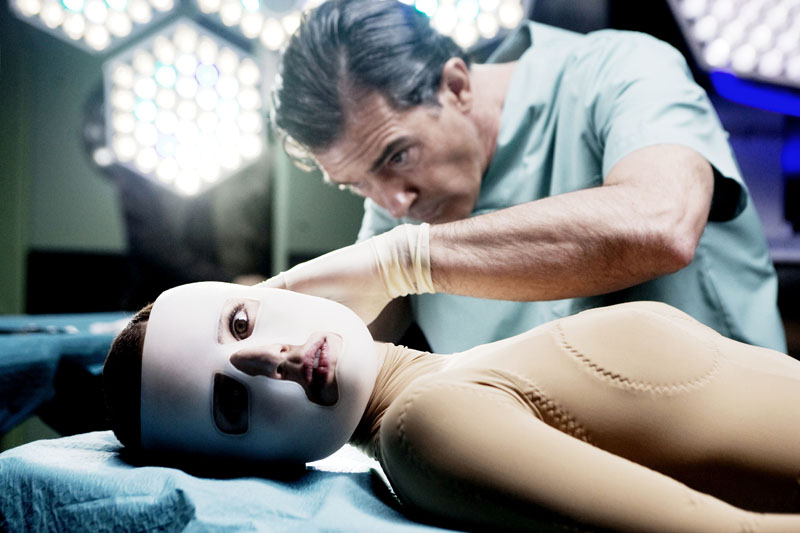
Pedro Almodóvar’s Spanish psychological thriller based on Thierry Jonquet’s novel “Mygale” follows Robert Ledgard (Antonio Banderas), a plastic surgeon working on “GAL”, a resistant artificial skin which is unaffected by insect bites or burns.
At a medical symposium, he privately confides to a colleague that he has not only been testing mice, but has also been conducting illegal transgenic experiments on humans, after which, he is prohibited from further research.
Despite being forbidden, Ledgard continues his work with his loyal servant, Marilla (Marisa Paredes) and his experimental subject, Vera (Elena Anaya). Vera is held captive in a locked room which contains a television, hand-knit dolls, yoga equipment, security cameras, and a wall plastered in her handwriting.
Many of Almodóvar’s trademarks like obsession, confusion, sexual identity, gender ambiguity, secrets, betrayal and death, combined with his ventures into new genres like science fiction and horror lead to a refined melodramatic classic with a vengeful core. Inspired by Georges Franju’s “Eyes Without a Face” and Fritz Lang’s thrillers, the heart-throbbing pace of the screenplay and the earnest exposition stories of the characters lead to the puzzle of the film slowly being solved.
With each line of dialogue spoken and every character’s movements; the audience works out, piece by piece, everything that happened before, everything that is happening now, and everything that motivates the characters to do what they do.
Typical of Almodóvar, the film’s design, costumes and colour are beautiful and uniquely stylistic thanks to his frequent collaborators – production designer Antxon Gómez and cinematographer José Luis Alcaine, together with Alberto Iglesias’ suspenseful music creates an intense, clinically chill feeling that is unusual for Almodóvar, but nonetheless fitting.
It premiered at the 64th Cannes Film Festival, and won Best Film Not in the English Language at the 65th BAFTA Awards. It was also nominated for the Golden Globe Award for Best Foreign Language Film and 16 Goya Awards.
6. Night and Fog (1955)
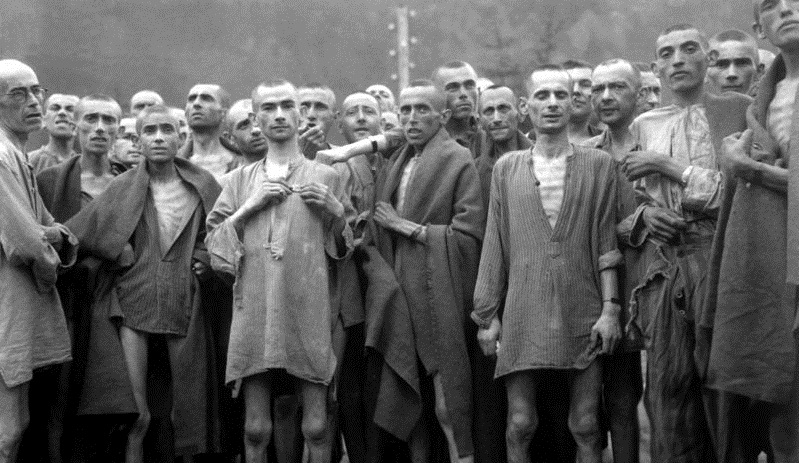
Alain Resnais’ French documentary short acts as a lasting reminder of what human beings are capable of doing to one another. The first film to truly address the Holocaust, it was only made ten years after the liberation of Nazi concentration camps.
Resnais collaborated with scriptwriter Jean Cayrol, a survivor of the Mauthausen-Gusen concentration camp in order to truthfully document the Nazi’s atrocities and inhumanity. The thirty-two minute film attracted a lot of controversy and faced difficulties with French censors, especially when trying to enter Cannes.
Narrated by Michel Bouquet, the documentary attempts to describe the rise of Nazi ideology and its quick escalation from thought to action to sadism that included torture, scientific and medical “experiments”, executions, and prostitution.
The diffusion of responsibility, blame and denial are at the film’s core as Resnais and Cayrel question who was responsible for these atrocious horrors. They show how many people involved in the death camps didn’t know how to deal with their own guilt and complicity or didn’t want to.
Juxtaposed black-and-white archival footage of concentration camps and their victims in pastoral colour footage of the buildings and locations ten years later, Resnais used stock footage from France, Belgium, and Poland, but conspicuously not from Germany, and chillingly alternates between past and present.
The film documents skeletal nude corpses being hung, it shows how the Nazi ‘s utilised the victims’ remains as much as possible, it bears witness to the gas chambers and crematoriums, and even includes footage of the dead being bulldozed into mass graves.
5. Das Experiment (2001)
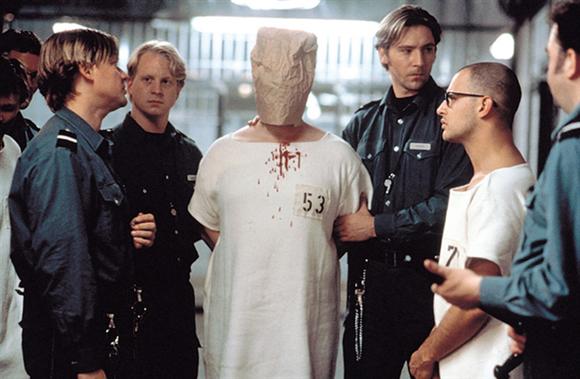
Oliver Hirschbiegel’s German thriller film based on Mario Giordano’s novel “Black Box” and Philip Zimbardo’s 1971 Stanford prison experiment follows Tarek Fahd, a taxi driver who finds a newspaper advertisement calling for participants for an experiment with a compensatory pay of 4000 German marks.
Tarek becomes interested not only for the cash payment, but also sees the experiment as a potential story since he used to be a journalist. He pitches the idea to his ex-boss, who reluctantly agrees and provides Tarek with a pair of glasses with a built-in mini-camera.
The social experiment is led by Professor Klaus Thon and his assistant, Dr. Jutta Grimm. Attempting to see how provided ‘roles’ change people’s behaviours and mentalities, they stimulate a prison situation in which they split their 20 volunteers into two groups; guards and prisoners.
In the experiment, the prisoners lose their civil rights and have to obey arbitrary rules like only wearing nightshirts, only referring to one another by their provided prisoner number (Tarek is prisoner number 77) and they must obey the guards’ orders.
The guards are given nightsticks, but are told not to use violence. Within a couple of days, the situation escalates as psychological changes develop as the guards become excessively aware of their power and manipulate the prisoners’ fear of humiliation.
Heavily inspired by the famous Stanford Prison Experiment of 1971, the film was remade in America in 2010 by Paul Scheuring and stars Adrien Brody and Forest Whitaker. Both of these films utilise some aspects of the real experiment and dramatise others, such as Tara being a journalist with videotaping glasses.
Probably the film which has remained the most true to the original social experiment is the recent 2015 American thriller, self – entitled, “The Stanford Prison Experiment” starring Billy Crudup, Ezra Miller, and Michael Angarano.
4. Eyes Without A Face (1960)
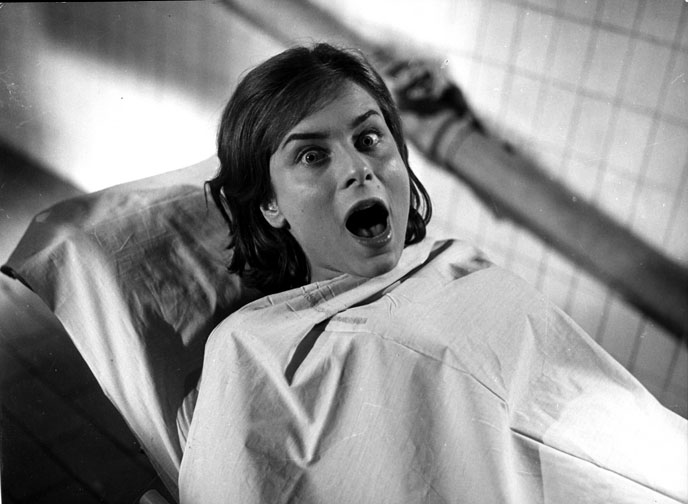
Georges Franju’s French horror adaptation of Jean Redon’s novel follows Dr. Génessier (Pierre Brasseur) who does everything he can to attempt to fix his daughter’s, Christiane’s, (Edith Scob) face, after it is horrifically disfigured in an automobile accident that he caused.
He experiments on his pet dogs to work on possible treatments while his daughter’s face remains hidden by an expressionless, stiff, white mask that covers everything but her eyes and resembles her face before the accident.
Dr. Génessier’s loyal assistant, Louise (Alida Valli), grooms young women with similar facial structures to Christiane into following her to Dr. Génessier’s house (and attached clinic). The two kidnap and chloroform the women and perform heterograft surgeries on them to try and restore Christiane’s face. However, following several unsuccessful attempts, Christiane becomes even more depressed as her life outside fades away.
Franju’s quietly absurd horror is poetically brutal refuses to cut away from the graphic images as he brings life to the stock characters of a mad scientist, his assistant, and his monster in a strangely sensitive and incredibly cerebral way.
The only foray into horror genre by the cofounder of the Paris Cinematique, the film has influenced several directors and films, including Spanish director Jesús Franco “The Awful Dr. Orloff” (1962) , the Italian film “Atom Age Vampire” (1961), the British film “Corruption”, (1968), John Woo’s action film “Face/Off” (1997), Pedro Almodóvar’s “The Skin I Live In” (2011), as well as influencing John Carpenter’s expressionless mask for the Michael Myers character in the slasher film series Halloween.
3. La Jetée (1961)
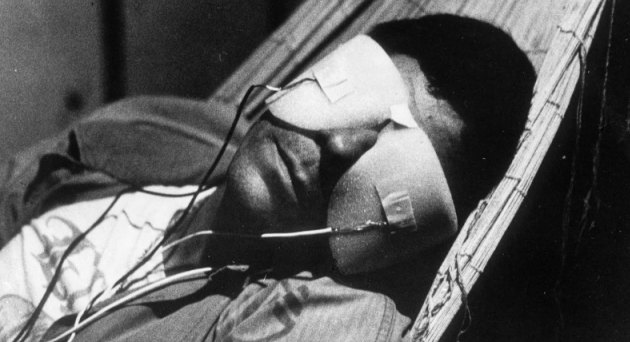
Chris Marker’s French science fiction short film is narrated by an unnamed man (Davos Hanich), who is a prisoner in the aftermath of World War III in a post-apocalyptic Paris.
Scientists are researching time travel in order to reconstruct their society and experiment on the protagonist, whose psychological link to the past is a vague pre-war memory of a beautiful woman (Hélène Chatelain) on the observation platform at an airport, shortly before some chaos arises and a stranger is mysteriously shot.
The experimenters utilise him and send him on multiple trips to the past and attempt to send him to the far future so as to find powerful technology which might help them in their present.
Constructed almost entirely from still photos and diffusing transitions, the twenty-eight minute black-and-white featurette relies on sound design, visually economic photographs, and emotional narration.. It won the Prix Jean Vigo for short film and went on to inspire Terry Gilliam’s 1995 science fiction cult classic “12 Monkeys”.
2. A Clockwork Orange (1971)
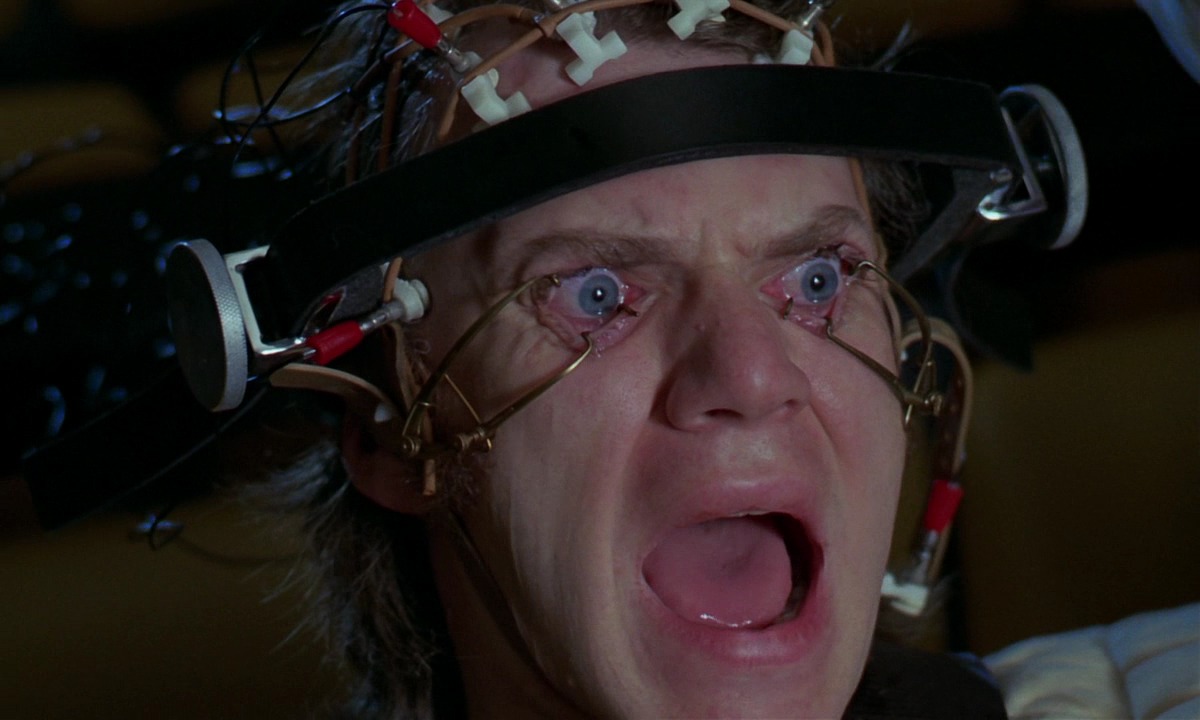
Stanley Kubrick’s most controversial film based on the dystopian 1962 novel by Anthony Burgess’s , was withdrawn from the United Kingdom by Kubrick himself for nearly thirty years due to its heavily criticised response.
The social sci-fi fable follows delinquent Alex De Large (Malcolm McDowell), a charismatic intelligent youth who gets a kick out of pornography, breaking the fourth wall, Beethoven and going on vivid, random rampages of “ultraviolence” with his bowler hatted, Doc Martin wearing, white overall-clad gang of “Droogs” (buddies).
Their vicious conquests include crippling strangers, raping defenceless women while singing renditions of “Singin’ In The Rain”, breaking into homes, getting intoxicated on drug-ladened “milk-plus”, and just beating up anyone who happens to pass by.
Eventually, Alex gets caught for one of his crimes and goes to prison. However, two years into the sentence, he gets the opportunity to become a test subject for the Minister of the Interior’s new Ludovico technique, an experimental aversion therapy for rehabilitating criminals within two weeks and then released.
Similar to behaviour modification techniques like Watson’s Classical Conditioning or Skinner’s Operant Conditioning, Alex is strapped to a chair, has his eyes clamped open, injected with drugs, and forced to watch nauseating films of sex and violence coincidentally set to Beethoven’s Ninth Symphony, his favourite one.
The conditioning treatment is successful and leaves Alex unable to engage in any sexual thoughts or violent actions, even in cases of self-defence. The prison chaplain complains Alex has had his free will stolen from him and that he is has not chosen to be good and asserts that goodness can only come from within.
However, the prison governor states that the Ludovico technique will cut down crime and help prevent prison over-crowding. Alex gains his freedom back, but at the cost of becoming dangerously ill every time he tries to act violently, thinks of a woman sexually, or listens to his blessed Beethoven.
Stanley Kubrick described the film as “…A social satire dealing with the question of whether behavioural psychology and psychological conditioning are dangerous new weapons for a totalitarian government to use to impose vast controls on its citizens and turn them into little more than robots.
This bold, thought provoking satire of society’s hypocrisy, corruption and sadism stylistically analyses institutionalised brutality and the fragility of individuality and personal rights in a startlingly funny way.
The extreme wide-angle lenses and blended classical and synthetic soundtrack provide a nightmarish aspect the film that is brilliantly punctuated with rhythmic utilisation of fast and slow motion that effortlessly stylize the violence and sex scenes, due to their off-beat pacing.
The film was nominated for several awards including Academy Awards for Best Director, Best Adapted Screenplay, best Film Editing and Best Picture, as well as BAFTA nominations acknowledging the art direction, cinematography, and soundtrack. McDowell was also nominated for a Golden Globe for his chilling portrayal as Alex.
1. Frankenstein (1931)
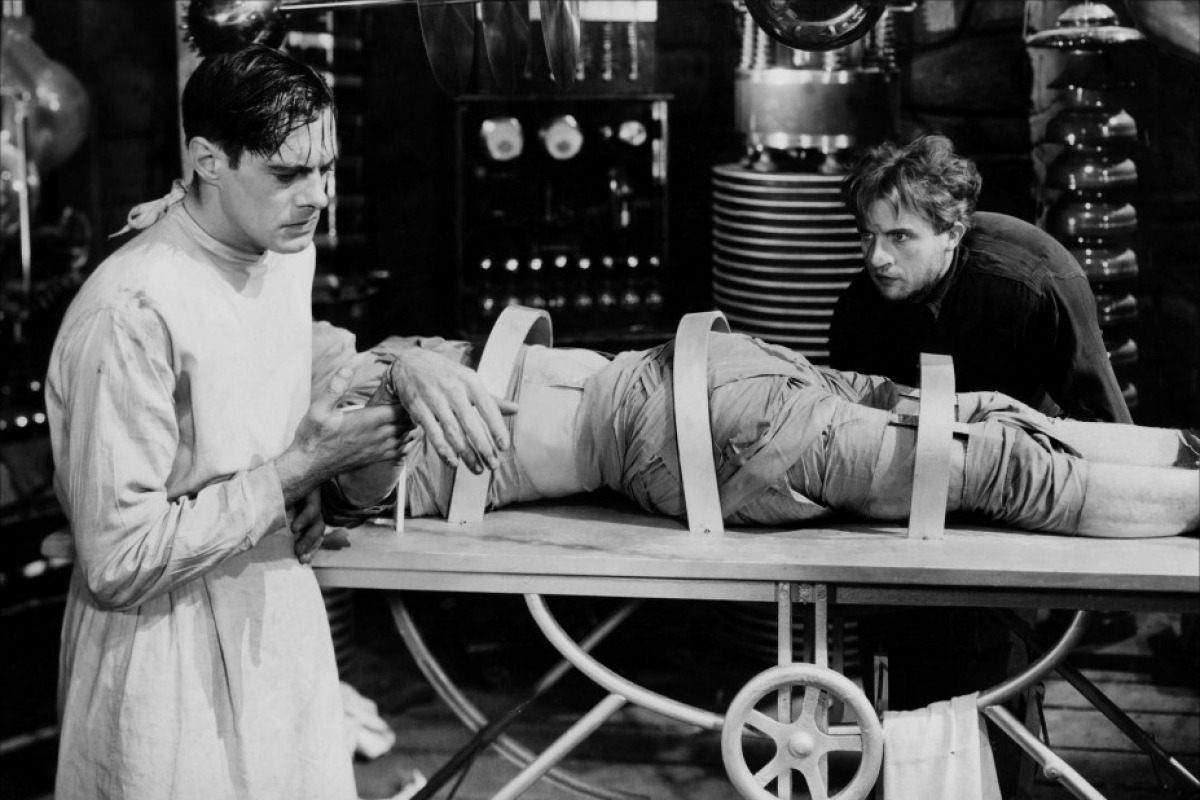
James Whale’s Pre-Code horror classic based on the play by Peggy Webling, which in turn is based on Mary Shelley’s novel of the same name), follows Dr. Henry Frankenstein (Colin Clive), a young, overachieving scientist, who, together with his hunchbacked assistant Fritz (Dwight Frye), steals human body parts and pieces them together to form a new body for piece together a human body that they can experiment on.
Frankenstein longs to create life, not only for the benefit of science, but to know what it feels like to be God. He finally succeeds with a crash of thunder, sparking electrical machines and chilling lightning as his built-together body finally comes alive (Boris Karloff). However, Fritz mistakenly gave the body a criminal, murderous mind and hysteria results.
Considered to be a cornerstone of the genre, the film’s iconic look is still being replicated today. Universal’s make-up genius, Jack Pierce, devised the monster’s unique appearance, with his electrified flattop hairstyle, neck bolts, heavy eyelids, elongated scarred hands and shoulder-padded, shabby suit that seemed to predict 80s fashion, managed to make him appear scary, but also translated the monster’s naivety and innocence.
The monster ironically evokes sympathy due to the horror mainly coming from people’s fierce hysteria and fast-paced judgement.
Karloff’ starred in the next two sequels, “Bride Of Frankenstein” (1935) and “Son of Frankenstein: (1939). Frankenstein’s story also continues in, “The Ghost of Frankenstein” (1942), “Frankenstein Meets the Wolf Man” (1943), “House of Frankenstein” (1945), and many more, including Mel Brooks’ “Young Frankenstein” (1974) . Kenneth Branagh also remade this film in 1994 with Robert De Niro starring as the monster.
Author Bio: Susannah Farrugia is an undergraduate Psychology student at the University Of Malta. Her life is measured in films and television shows. She enjoys drawing scenes and designing posters based on the films she has seen.
10 Replies to “The 20 Best Movies About Human Experiments”
A Clockwork Orange (1971) Men Behind the Sun (1988) Martyrs (2008) The Human Centipede (2009) Experimenter (2015) The Stanford Prsion Experiment (2015)
Experimenter (2015) is actually very good! I liked that movie.
I’d also site A Clockwork Orange.
Also, for what it’s worth, Bruce Joel Rubin’s original screenplay of Jacob’s Ladder didn’t include the, imo, wholly unnecessary, military conducting experiments upon soldiers unwittingly via violence-enhancing hallucinogenics to advance (or explain away) the plot, or muddy it up, depending upon one’s take on it! …considering that it’s essentially a story about the human soul’s brief time between earthly existence and the afterlife.
Initially, the story was more overtly rooted in Christian themes, iconography and metaphysics (Dante’s Inferno, Meister Eckhart, winged angels, fire and brimstone, etc) but when it was decided to remove the more obvious Heaven and Hell references and imagery and instead make those elements more symbolic and suggestive, the military drugging soldiers shtick, although an unfortunate fact of how the military operates, was likewise brought to the table to help make the already-confusing-to-American-audiences story of Jacob’s Ladder a bit more cohesive/palatable for audiences accustomed to Large Print stories (the screenplay was written in the 1970s, and no studio would touch it for many yrs)
Don’t get me wrong–the plot still works with that 11th hour military bit added in while not completely ruining the central spiritual gist of the story …but after knowing that Rubin’s org screenplay was much broader in scope, and even creepier–Jake’s subjective experience was initially going to accompany the biblical Apocalypse, with all of NYC turning into a Hades–the whole military/drugging angle seems like an clunky, unnecessary red herring of sorts that wasn’t needed to explain to audiences what was happening to the protagonist. For those interested, Rubin’s screenplay–along with many of his ruminations on writing the story–is, or used to be, available in paperback book form.
<<o. ★✫★✫★✫★✫★✫★✫★✫★✫★✫★✫★✫★✫★✫★✫★✫★✫★✫★✫★✫★✫★✫★✫★✫★✫★✫★✫★:::::::!!be425p:….,..
Does this book have the same name? Sounds interesting.
‘Altered States’ ??
<<o. ★✫★✫★✫★✫★✫★✫★✫★✫★✫★✫★✫★✫★✫★✫★✫★✫★✫★✫★✫★✫★✫★✫★✫★✫★✫★✫★:::::::!!be201p:….,….
Top 2 should be Shutter Island and The Skin I Live In.
Please, please edit your lists before they are published. There are many good lists here that I won’t share because of typos and mistakes. Makes the site look like amateur hour.
I hope people who create word games and other internet activities that require English words, see your comment. Because I am an educated adult, I usually immediately recognize misspelled words. But what about the young learner and those just learning to read? There are a good many people who accept the written word as “gospel.” Whatever one writes for the general public should ALWAYS be correctly spelled!
Leave a Reply Cancel reply
This site uses Akismet to reduce spam. Learn how your comment data is processed .
Experimenter
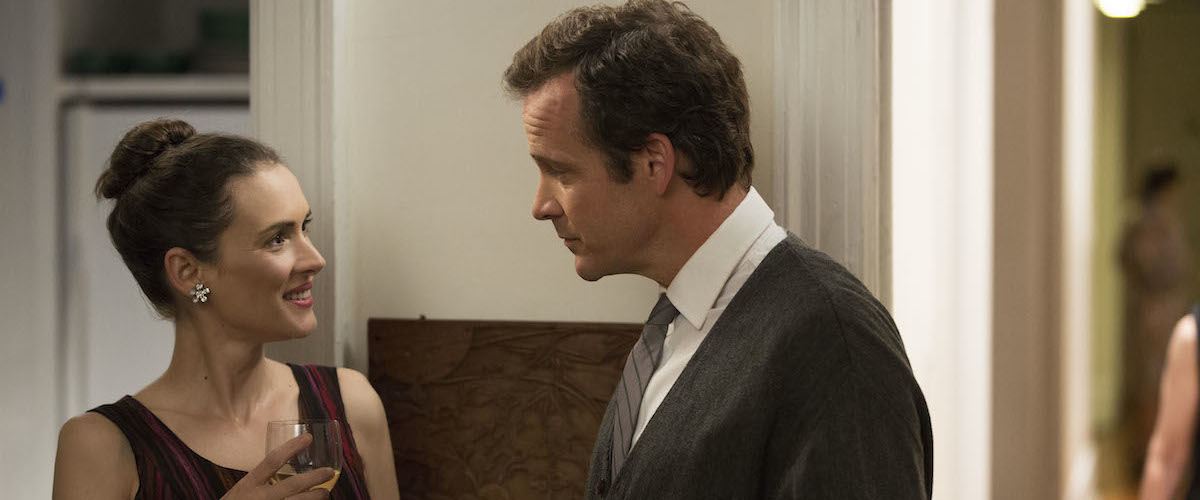
Orson Welles once described his approach in " Citizen Kane " as "prismatic," and while there are many differences in subject and style between that cinema milestone and Michael Almereyda 's "Experimenter," the two films share a multi-faceted formal playfulness and an essential intellectual seriousness that make them similarly bracing, original and thought-provoking. Part of the latter quality comes from their focus on men (one semi-fictional, the other real) who stand at particular junctures of American history and, like prisms, refract converging elements of our national identity and culture.
The most pleasingly cerebral of recent American films, "Experimenter" concerns Dr. Stanley Milgram ( Peter Sarsgaard in an expertly shaded and intelligent performance), the creator of certain enduringly famous experiments in social psychology, which the film starts out by showing us. In a psych lab at Yale University in 1961, Milgram watches from behind a two-way mirror as an associate (John Palladino) escorts two men into a room where he explains the experiment in which they've agreed to participate. One man will be called "Learner" and will try to memorize answers to standardized tests. The other man, "Teacher," will monitor the responses given by Learner (who's out of sight) and, when he gives wrong answers, give him a series of increasingly strong electric shocks.
The nominal experiment here is a sham. In reality, Learner is not being shocked; an actor, he plays audiotapes of his voice screaming and protesting as the shocks supposedly mount in intensity. The one being tested is Teacher. How long will he go on shocking a stranger who's begging him to stop? An overwhelming majority of people say they would stop well before the shocks reach maximum intensity. As it happened, though, both in Milgram's original experiments and in numerous duplications of them, roughly 65 percent of subjects kept applying the shocks till the end; only 35 percent stopped at some point before.
Temporally, the significance of the Milgram Experiments cuts in every direction.
Past: When they were underway, the Israeli trial of Nazi genocide mastermind Adolf Eichmann, who claimed he was only following orders, was on American television. The son of European Jews who escaped the Nazi terror, Milgram wanted to know how ordinary people could do things that violated their conscious principles. And could it be that folks of other nations – even Americans – would submit just as Germans had? The scandalous book in which he revealed his findings was titled "Obedience to Authority."
Present (1961): In a sense, the Eichmann trial connects the Holocaust to the era of "The Manchurian Candidate," when Americans were so fearful of their Communist enemies that they questioned their own psychological make-up, and when an academic-scientific-military complex emerged to deal with such concerns. Needless to say, that complex didn't disappear along with the Soviet Union.
Future: As the film shows, when Milgram's findings become public, they spark widespread interest, with some hailing their importance while others denounce the scientist's methods as unethical and manipulative. Their paradoxical importance continues. During the Vietnam War they are invoked to explain the My Lai massacre. Films of them are still shown to West Point cadets. Need their relevance to the post-9/11 American penchant for torture, both military and more broadly cultural, be stated?
Back to those scenes in the Yale lab. In most movies, no doubt, we would be kept in doubt about the experiment's real nature until we'd seen at least one Learner shocked to the breaking point. But Almereyda tosses away the possibility of suspense and shows us what's going on from the first. Filmed with a cool, Kubrickian detachment, these scenes align our p.o.v. not with the experiment's participants' but with the scientist's (and by extension, the filmmaker's). Rather than conventionally dramatic, the effect is wry, inquisitive, even darkly comic.
During this early sequence, Almereyda intercuts scenes of Milgram meeting the dancer ( Winona Ryder ) who will become his wife. These passages announce that "Experimenter" will concern not just the work but also the man. Yet, if this is a biopic, it's hardly a conventional one. It seems not at all interested in probing Milgram's psychology, to wonder why he would undertake this type of work. And, in effect, the film's wife-and-family parts have a basically negative function in that, rather than explaining anything, simply tell us he was a fairly ordinary guy.
So, ultimately, Almereyda's emphasis falls on his subject's work and public life. After the famous experiments and the book that followed, Milgram becomes something of a controversial public intellectual, moves to Harvard (then later City University of NY) and concocts other experimental tests of human behavior, some very interesting but none achieving the notoriety of the earlier ones. As the career unfolds, we become aware of how much the academic-scientific-military complex intersects with the nation's imagination on various pop-cultural fronts. Milgram himself is on television. He engages with "Candid Camera." He watches CBS turn his life's work in a bad TV movie, "The Tenth Level," starring William Shatner and Ossie Davis .
As we see that monstrosity being shot, Milgram muses to the camera about his chagrin. When he thinks of turning his work into a Broadway musical, he bursts into song on a midtown street. All of which points to one of the film's chief delights: its eclectic mix of formal stratagems and narrative modes. Almereyda has Milgram address the camera frequently, sometimes telling us of things that haven't yet happened. He uses rear-screen projection (which serves various purposes, including evoking a bygone cinematic era), various surrealistic touches and all manner of distancing devices. His tone veers from serious to satiric to wacky to contemplative and back to serious, sometimes within a single scene.
The thread that unifies all this, one might venture, has to do with the issue of free will. The upside of Milgram's experiments (as one of his mentors attempts to point out) was to show that at least a significant minority of people can resist unwarranted social controls. What about trying to construct an educational system and a society that grow that number? Likewise, though many people love to be manipulated by movies, how about asserting the value of works like "Experimenter," which, in keeping the emotional temperature low and presenting us with a collage of evidence on related subjects, allows us the interpretive freedom to construct its meanings for ourselves?
No doubt, that kind of freedom is only offered us by a certain type of artist, of which Almeredya is a prime and invaluable example. From early in his career, it was clearly that he was an unusually gifted director, yet rather than allowing himself to be sucked into the mainstream moviemaking system, he has deliberately stayed on the intelligent margins, making a range of films from docs to shorts to modern Shakespeare adaptations to works that deserve the designation experimental. In so doing, he has allowed himself a creative freedom that suffuses his latest like a constant stream of mountain air. "Experimenter," he might say, "c'est moi."


Godfrey Cheshire
Godfrey Cheshire is a film critic, journalist and filmmaker based in New York City. He has written for The New York Times, Variety, Film Comment, The Village Voice, Interview, Cineaste and other publications.
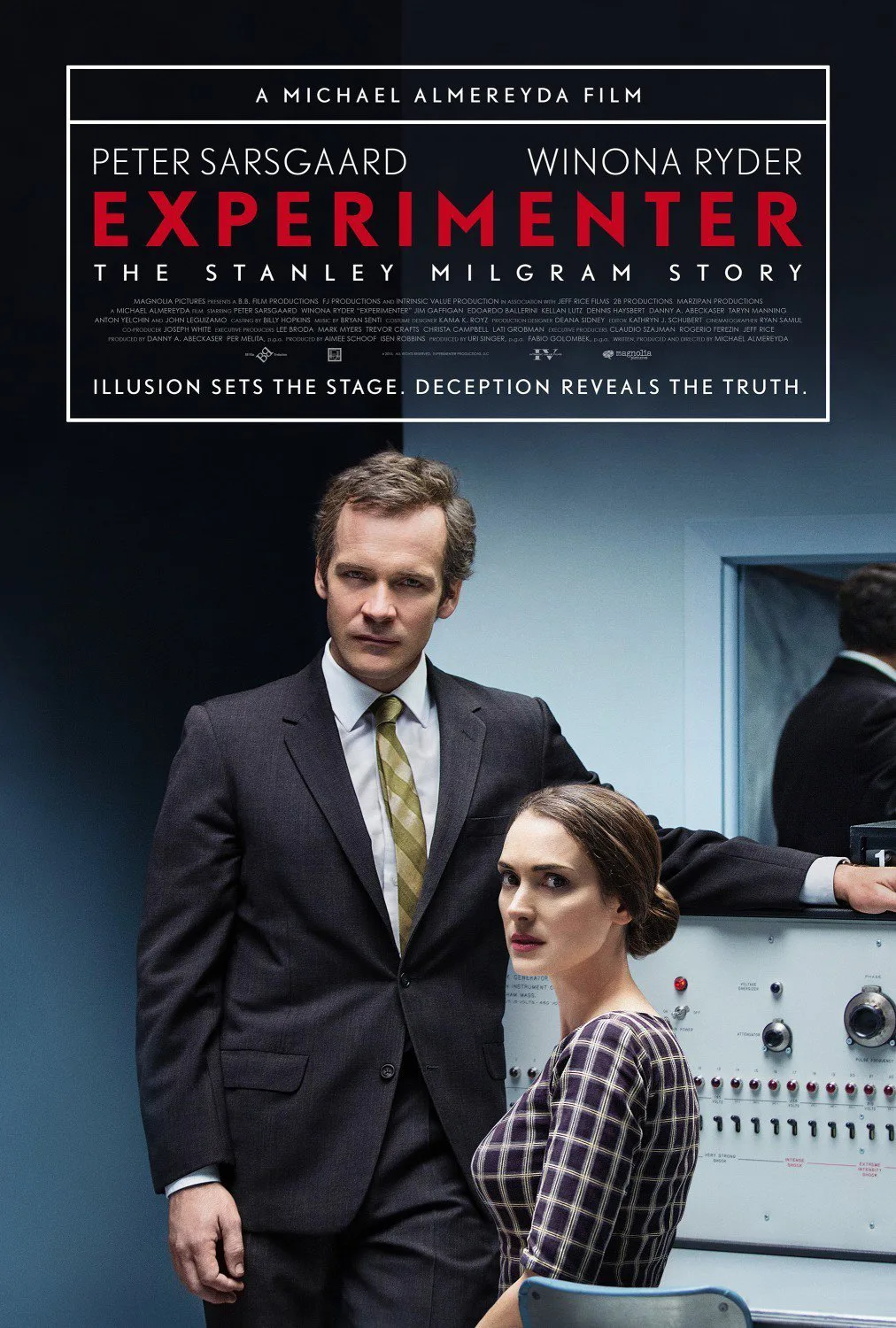
- Dennis Haysbert as Ossie Davis
- Taryn Manning as Mrs. Lowe
- Winona Ryder as Sasha Menkin Milgram
- Jim Gaffigan as James McDonough
- Peter Sarsgaard as Stanley Milgram
- John Leguizamo as Taylor
- Kellan Lutz as William Shatner
- Anton Yelchin as Rensaleer
- Lori Singer as Florence Asch
Original Music Composer
- Bryan Senti
- Kathryn J. Schubert
- Michael Almereyda
Director of Photography
Leave a comment, now playing.

The Piano Lesson
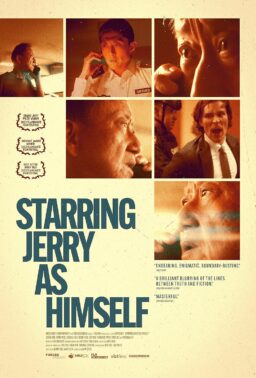
Starring Jerry As Himself
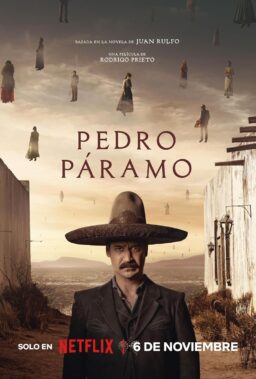
Pedro Páramo
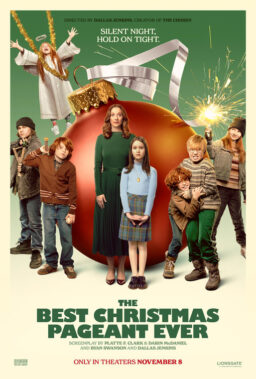
The Best Christmas Pageant Ever
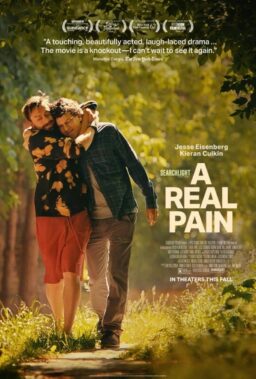
A Real Pain
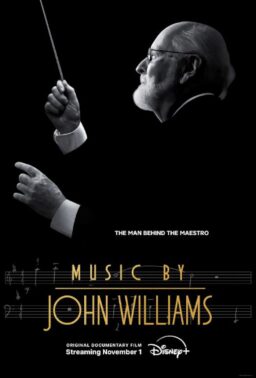
Music by John Williams
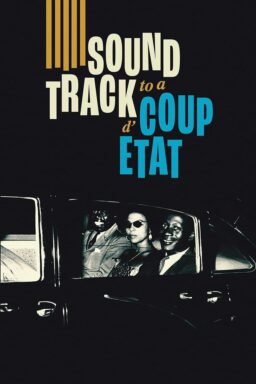
Soundtrack to a Coup d'État

No Other Land
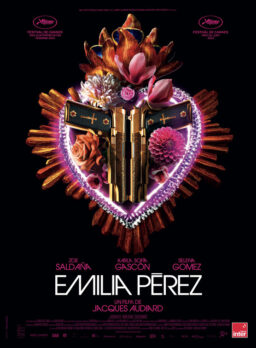
Emilia Pérez
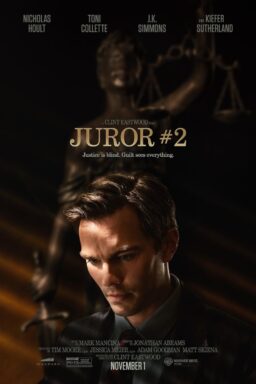
Latest articles

Black Harvest Film Festival 2024 Preview
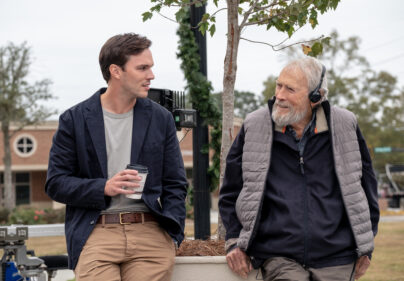
A Prophet is Without Honor in His Own Country; or, The Curious Case of Clint Eastwood
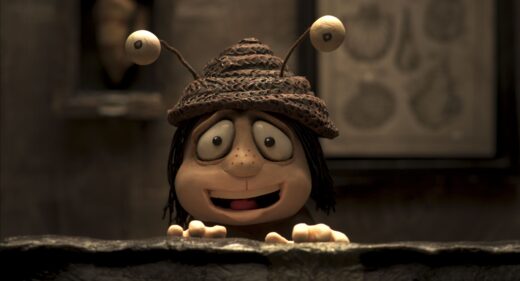
Living Forward: Adam Elliot on "Memoir of a Snail"
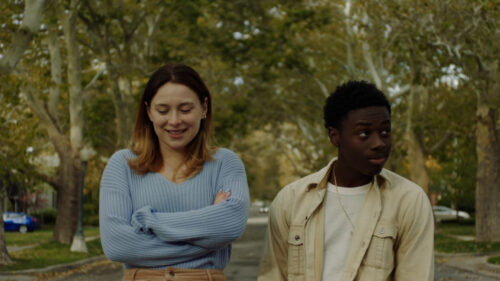
Female Filmmakers in Focus: Hannah Peterson on "The Graduates"
The best movie reviews, in your inbox.
- 20 Mind-Bending Movies That Are A Mental Workou...
- Movies That Were Eerily Ahead Of Their Time
- These Stirred Up Huge Controversies
- Freakin' Intense
- Are You Talking To Me?
- 2 Movies in 1
- Great Movies That Have Almost No Dialogue
- 16 Movies Where Pretty Much Everyone Dies
- Movies That Launched Entire Genres
- Unexpected Horror Movie Hits That Came Out Of N...
- The Best Movies Critics Hated
- Spoiler: Nobody Is a Winner
- In Which Crazy Tech Does More Harm Than Good
- Ordinary People Breaking Bad
- Movies With Great Anticlimactic Endings That Ar...
- The Hero Is Really a Villain!
- In Which the Mystery Remains a Mystery
- Movies That End Right at the Beginning
- TV Comedies And Dramas With The Exact Same Prem...
- Movies That Are Great When You Go in Blind
- Never Go to a Second Location
The 30+ Best Experimental Movies
Welcome to the captivating realm of films that challenge conventions, play with form and substance, and provoke discussion. Our expertly-curated Ranker list serves as your guide to the best controversial experimental films that captivated the audience and redefined cinematic storytelling. Wielded by visionary directors, these films push the boundaries, disrupt common tropes, and invoke powerful reactions.
Rooted in an experimental and provocative ethos, these films are loaded with unique narrative styles, expressive visual language, and characters that defy the mainstream cinema. From surreal dreamscapes to disquieting realities, the chosen films encapsulate a wide range of topics and themes, making this a versatile list that caters to diverse tastes.
Compare films and dive into the nuances by leveraging our user-friendly interface. Learn about each film's vivid descriptions, key cast members, and notable facts. Enrich your movie watching experience and engage in enlightening conversations as you explore the world of controversial experimental cinema.
Gain instant access to your preferred films with our integrated streaming service buttons. Whether you are a subscriber of Netflix, Disney+, Max, Hulu, Paramount+, or Amazon Prime, our website offers seamless navigation to your streaming platform of choice. Each film entry harbors clickable buttons redirecting to the movie on the above-mentioned platforms, ready to be streamed at your convenience.
Revel in the rich diversity this list offers, from psychological dramas to outlandish horror, each film's distinct style and daring narrative brings something new to the table. Connect with the Ranker community, gather insights, and join the ongoing debate on these ground-breaking films.
Our Ranker list stands as a testament to cinema's transformative power. Unveiling stories that stay with the audience, these controversial experimental films beckon to the curious and the adventurous. Join others in discovering unexplored cinematic territory and find your next watching experience here on Ranker. Delve deeper, explore further, and embrace the power of experimental films.
Seven Servants
Seven Servants is a masterclass in experimental cinema that effortlessly melds together unconventional storytelling techniques with striking visual aesthetics to create an unparalleled viewing experience. The film's intricate story structure challenges traditional notions of linear storytelling, taking viewers on an immersive journey filled with unexpected twists and turns. Its breathtaking cinematography further accentuates the captivating atmosphere created by this remarkable piece of artistry. Combining these elements with thought-provoking themes exploring power dynamics and human relationships, Seven Servants truly transcends cinematic norms to stand as an extraordinary example of innovative filmmaking.
- Released : 1996
- Directed by : Daryush Shokof

Flushers is an avant-garde masterpiece that skillfully pushes the boundaries of conventional storytelling and filmmaking techniques. This experimental gem showcases a bold vision, utilizing daring themes and innovative visual styles to challenge viewers' perception of cinema. With its striking imagery and unconventional story structure, Flushers takes audiences on a surreal journey through uncharted territories, constantly defying expectations while leaving an indelible mark on the world of film. The groundbreaking directorial approach ensures that this enigmatic work stands as a testament to the limitless potential for artistic expression within the medium.
- Released : 2013

Breathful is an enthralling tour de force in experimental cinema that successfully marries exceptional visual innovation with audacious thematic explorations. The film's distinct style lends itself to a hypnotic viewing experience, as viewers are drawn into the labyrinthine story that defies traditional expectations. The daring directorial choices and sublime cinematography create an unparalleled atmosphere of intrigue, ensuring that Breathful remains a fascinating example of boundary-pushing cinema. This artistic triumph is sure to captivate film aficionados and casual viewers alike with its unyielding ambition and visionary execution.
- Released : 2007

Asudem presents an intriguing amalgamation of visceral horror elements and provocative thematic underpinnings. This visionary piece redefines genre conventions by employing cutting-edge visual styles and story devices to create an immersive experience like no other. Through its evocative blend of nightmarish imagery, disturbing symbolism, and thoughtfully constructed plotlines, Asudem offers a startling exploration into the darkest recesses of human nature. With its unrelenting intensity and masterful filmmaking prowess, this standout work leaves a lasting impact on viewers long after the credits have rolled.
- Released : 2006

An Andalusian Dog
An Andalusian Dog remains an undisputed classic within the realm of experimental cinema, boasting an impressive legacy that continues to inspire filmmakers today. As one of the earliest examples of surrealist film, this groundbreaking masterpiece effortlessly blurs the lines between reality and fantasy through its dreamlike imagery and unconventional story structure. Its provocative themes exploring human desire, fear, and obsession are expertly woven throughout each frame, sustaining a palpable tension that leaves viewers enthralled long after their initial viewing experience has ended. Timeless in its avant-garde vision, An Andalusian Dog undeniably remains an essential piece within any cinephile's collection.
- Released : 1929
- Directed by : Luis Buñuel

The Discreet Charm of the Bourgeoisie
The Discreet Charm of the Bourgeoisie stands tall as a groundbreaking entry in experimental cinema, thanks to its inventive blend of biting social commentary and surreal storytelling techniques. This acclaimed work showcases masterful craftsmanship in both its screenplay and visual presentation, resulting in an unforgettable cinematic journey that keeps viewers riveted from start to finish. With its subversive exploration of bourgeois society's hypocrisies and contradictions, this scathing satire delves deep into the human psyche while challenging long-held societal norms. The Discreet Charm of the Bourgeoisie undoubtedly serves as a shining example of experimental filmmaking at its finest.
- Released : 1972

Eraserhead is widely regarded as a seminal work within the annals of experimental filmmaking history due in large part to David Lynch's singular vision and artful execution. This surrealistic nightmare masterfully combines vivid imagery with a hauntingly atmospheric soundtrack, creating an immersive experience that delves deep into the anxieties of parenthood and modern life. The film's innovative story structure and striking visual design ensure that it remains as captivating today as when it first made waves in the cinematic world. A bold testament to the power of imagination, Eraserhead continues to captivate audiences with its otherworldly allure.
- Released : 1977
- Directed by : David Lynch

La Jetée stands as a shining example of experimental cinema's limitless potential, combining groundbreaking storytelling techniques with awe-inspiring visual innovation. Comprised entirely of still images, this avant-garde masterpiece skillfully utilizes unconventional methods to weave a complex story exploring themes of time travel, memory, and human existence. Its haunting atmosphere is further accentuated by a masterful use of sound design, ensuring that La Jetée remains an enduring classic within the realm of experimental film. With its imaginative approach and thought-provoking themes, this landmark work serves as an inspiration for filmmakers seeking to break new ground in cinematic storytelling.
- Released : 1962
- Directed by : Chris Marker

Tetsuo: The Iron Man
Tetsuo: The Iron Man is indisputably one of the most iconic entries within experimental cinema history thanks to its distinctive visual style and uncompromising thematic exploration. This cyberpunk cult classic pushes boundaries with its raw portrayal of urban decay, violence, and humanity's relationship with technology while employing inventive filmmaking techniques that challenge traditional expectations. Its frenetic pace and visceral imagery combine to create an unforgettable experience that has left an indelible mark on both genre cinema and experimental film alike. For those seeking a thrilling and daring cinematic journey into uncharted territory, look no further than Tetsuo: The Iron Man .
- Released : 1989
- Directed by : Shinya Tsukamoto

Pierrot le Fou
Pierrot le Fou is widely celebrated as Jean-Luc Godard's magnum opus within experimental cinema, seamlessly blending his signature stylistic flair with a thought-provoking exploration of love, politics, and art. The film's unconventional story structure keeps viewers captivated from start to finish while showcasing Godard's mastery over visual storytelling techniques such as jump cuts, handheld camera work, and bold color palettes. Pierrot le Fou ultimately serves as a prime example of the French New Wave movement's indelible impact on cinematic history while standing tall among experimental cinema classics.
- Released : 1965
- Directed by : Jean-Luc Godard

Man with a Movie Camera
Man with a Movie Camera represents not just an important milestone in experimental cinema but also a groundbreaking achievement in documentary filmmaking. This non-story visual symphony employs innovative directorial techniques and masterful editing to showcase the bustling everyday life of a city while simultaneously exploring the relationship between man and machine. Its impact on future generations of filmmakers cannot be overstated, as Man with a Movie Camera's revolutionary approach to storytelling continues to resonate within the world of contemporary cinema. A true testament to creativity and artistic vision, this avant-garde masterpiece remains essential viewing for cinephiles and casual film enthusiasts alike.
- Directed by : Dziga Vertov

Koyaanisqatsi
Koyaanisqatsi is undoubtedly one of the most important works in experimental cinema, functioning as a mesmerizing visual poem that explores humanity's impact on the natural environment through stunning images and an evocative score by Philip Glass. This unique cinematic experience transcends traditional story structures, focusing instead on conveying its powerful themes through artful cinematography and expertly crafted montages. Imbued with a sense of both wonder and urgency, Koyaanisqatsi remains an enduring reminder of our connection to the Earth and our responsibility as stewards of its delicate balance.
- Released : 1982
- Directed by : Godfrey Reggio

The Color of Pomegranates
The Color of Pomegranates reigns supreme as one of the most visually arresting entries within experimental cinema history, offering a feast for the senses with its breathtaking cinematography, lush color palette, and evocative imagery. This poetic biopic of Armenian troubadour Sayat-Nova draws upon rich cultural symbolism to weave an intricate tapestry exploring themes such as spirituality, love, and artistic expression. The film's innovative structure and director Sergei Parajanov's keen attention to detail ensure that The Color of Pomegranates remains a vital contribution to the experimental film canon.
- Released : 1968
- Directed by : Sergei Parajanov

Begotten is an undeniably polarizing entry within experimental cinema due in large part to its stark visual style and provocative thematic explorations. This avant-garde horror opus employs grainy, high-contrast black-and-white visuals to depict a nightmarish landscape imbued with symbolism and mystique. Its haunting atmosphere is further enhanced by a minimalist soundtrack that keeps viewers fully immersed within the world created by writer-director E. Elias Merhige. Challenging yet rewarding in equal measure, Begotten ultimately serves as an unforgettable example of experimental filmmaking at its most audacious.
- Released : 1991
- Directed by : E. Elias Merhige

The Last of England
The Last of England is a powerful work within experimental cinema that stands as director Derek Jarman's visceral response to the social upheaval experienced during 1980s Britain. Incorporating found footage alongside newly filmed segments featuring symbolic imagery reflecting themes such as decay, rebellion, and loss, this impressionistic journey offers viewers a captivating meditation on national identity in times of crisis. With its uncompromising vision and evocative visuals, The Last of England remains an enduring example of Jarman's mastery within the realm of experimental filmmaking.
- Released : 1987
- Directed by : Derek Jarman

Twin Peaks: Fire Walk With Me
Twin Peaks: Fire Walk With Me serves as both a prequel to David Lynch's iconic television series "Twin Peaks" and an engrossing entry within experimental cinema in its own right. The film delves deeper into the dark undercurrents of the titular town, exploring themes of violence, duality, and otherworldly forces that remain a hallmark of Lynch's oeuvre. Its surreal visuals and enthralling story structure contribute to an immersive atmosphere that keeps viewers on edge until the very end. As a vital extension of the Twin Peaks universe and a showcase for Lynch's experimental filmmaking prowess, Fire Walk With Me remains a must-see for fans of all film genres.
- Released : 1992

Pi is an outstanding entry within experimental cinema that finds writer-director Darren Aronofsky deftly combining elements of psychological drama, existentialism, and mathematical mysticism to create an unforgettable viewing experience. The film follows a paranoid mathematician as he uncovers hidden patterns in numbers with potentially world-altering implications. Shot in high-contrast black-and-white with dizzying camera work and innovative editing techniques, Pi represents an impressive debut from Aronofsky that showcases his mastery over visual storytelling while expertly exploring deep philosophical themes.
- Released : 1998
- Directed by : Darren Aronofsky
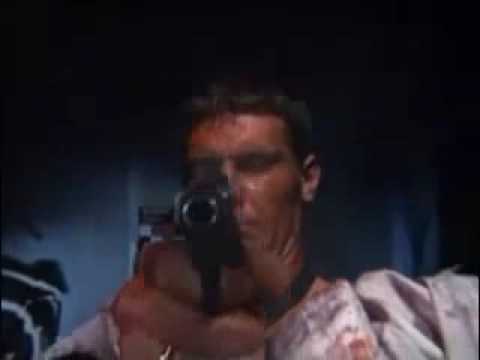
Performance
Performance represents a bold and innovative foray into experimental cinema that continues to captivate audiences with its daring story structure, striking visual aesthetics, and thought-provoking themes. Co-directed by Donald Cammell and Nicolas Roeg, this groundbreaking work charts new territory within the realm of crime films while expertly delving into concepts such as identity, duality, and the transformative power of art. Boasting standout performances from James Fox and Mick Jagger in their respective roles as an enforcer and reclusive rock musician, Performance remains essential viewing for fans of both experimental cinema and classic British filmmaking.
- Released : 1970
- Directed by : Donald Cammell

El Topo is a pioneering work within experimental cinema that combines elements of Westerns and Eastern mysticism with visually arresting imagery to create an unforgettable cinematic experience. Writer-director Alejandro Jodorowsky infuses this avant-garde masterpiece with dense symbolism exploring themes such as spirituality, violence, and redemption while offering viewers a hallucinatory journey unlike any other in film history. Regarded as one of the first "midnight movies" due to its cult following during late-night screenings at New York City's Elgin Theater, El Topo remains essential viewing for fans of both experimental cinema and genre-defying artistry.
- Directed by : Alejandro Jodorowsky

The Testament of Orpheus
The Testament of Orpheus is a mesmerizing entry within experimental cinema that deftly combines stunning visuals, surreal storytelling techniques, and deeply philosophical themes exploring man's relationship with art. As the final installment in Jean Cocteau's Orphic Trilogy , this enigmatic film serves as both a capstone to his body of work and a brilliant exploration into the intersection between reality and fantasy. Simultaneously poetic and self-reflexive in its execution, The Testament of Orpheus remains an important milestone within experimental filmmaking history that continues to inspire artists across multiple disciplines.
- Released : 1960
- Directed by : Jean Cocteau

Uncle Boonmee Who Can Recall His Past Lives
Uncle Boonmee Who Can Recall His Past Lives is a spellbinding entry within experimental cinema that transports viewers into a dreamlike realm filled with mythical creatures, spiritual exploration, and meditations on the nature of existence. Winner of the prestigious Palme d'Or at the 2010 Cannes Film Festival, this masterful work effortlessly weaves together elements of magical realism with traditional Thai folklore to create an atmospheric experience that lingers in the minds of viewers long after their initial introduction to this enchanting world. With its captivating visual style and thoughtfully constructed story, Uncle Boonmee Who Can Recall His Past Lives stands as an exceptional example of contemporary experimental cinema.
- Released : 2010
- Directed by : Apichatpong Weerasethakul

Inland Empire
Inland Empire stands as a testament to David Lynch's unyielding dedication to pushing boundaries in experimental cinema. This sprawling, three-hour odyssey delves deep into themes such as identity, dream logic, and Hollywood's dark underbelly while showcasing Lynch's signature blend of surreal imagery and atmospheric sound design. Employing groundbreaking digital filmmaking techniques that lend a distinctively raw visual style to the piece, Inland Empire represents a daring artistic departure for Lynch while simultaneously affirming his mastery over the medium.

My Winnipeg
My Winnipeg is a fascinating entry within experimental cinema that seamlessly combines elements of documentary filmmaking, autobiography, and surrealistic storytelling techniques to explore director Guy Maddin's complex relationship with his hometown. This evocative journey through memory and myth offers viewers an immersive glimpse into both the personal and cultural aspects of life in Winnipeg while showcasing Maddin's unique artistic vision. With its striking visuals and introspective themes, My Winnipeg stands as an essential work within contemporary experimental cinema.
- Directed by : Guy Maddin

Last Year at Marienbad
Last Year at Marienbad is a seminal entry within experimental cinema due in large part to Alain Resnais's masterful direction and innovative story structure. This enigmatic film challenges viewers' perceptions of time, memory, and the human experience by weaving together multiple storylines that blur the line between reality and illusion. Its stunning visuals and evocative atmosphere add further depth to this labyrinthine journey through the mindscape of its characters. As a shining example of the French New Wave movement, Last Year at Marienbad remains an enduring classic within experimental filmmaking.
- Released : 1961
- Directed by : Alain Resnais

Meshes of the Afternoon
Meshes of the Afternoon is widely regarded as one of experimental cinema's foundational works thanks to its innovative blending of surrealist imagery and avant-garde story techniques. This influential short film by Maya Deren and Alexander Hammid immerses viewers within a dreamlike atmosphere filled with recurring motifs, symbolism, and psychological underpinnings. Heralded for its groundbreaking approach to visual storytelling that would later influence filmmakers such as David Lynch and Stan Brakhage, Meshes of the Afternoon remains an essential piece within any cinephile's collection.
- Released : 1943
- Directed by : Maya Deren, Alexandr Hackenschmied

Superstar: The Karen Carpenter Story
Superstar: The Karen Carpenter Story represents a unique foray into experimental cinema that employs unconventional storytelling methods to explore themes such as celebrity, addiction, and media manipulation. Director Todd Haynes utilizes Barbie dolls in place of live actors to recount the tragic story of pop singer Karen Carpenter's battle with anorexia nervosa. This enigmatic film examines societal expectations surrounding body image while offering a haunting meditation on the darker aspects of fame. As an early example of Haynes' innovative approach to filmmaking, Superstar remains an important milestone within experimental cinema history.
- Directed by : Todd Haynes

Poison is an audacious work within experimental cinema that combines three disparate storys spanning various time periods and genres to examine themes such as desire, fear, and societal taboos. Writer-director Todd Haynes employs inventive storytelling methods using both nonlinear plot structures and groundbreaking visual techniques to create an immersive atmosphere filled with intrigue and tension. With its daring exploration of controversial subject matter and artful execution, Poison remains an essential piece within any experimental film enthusiast's collection.

The Element of Crime
The Element of Crime is an enthralling entry within experimental cinema that finds visionary director Lars von Trier deftly combining elements of film noir with philosophical meditations on human nature, crime, and redemption. This visually stunning work employs a distinct color palette dominated by sepia tones to create an atmospheric backdrop for its labyrinthine exploration into the psyche of a detective tasked with solving a series of murders. With its innovative story structure and thought-provoking themes, The Element of Crime remains an enduring classic within both genre cinema and experimental filmmaking.
- Released : 1984
- Directed by : Lars von Trier

Gummo is a deeply affecting entry within experimental cinema that serves as both writer-director Harmony Korine's debut feature and a stark portrait of rural American life on the fringes. Employing nontraditional story structures and strikingly raw visuals, this provocative work delves into themes such as alienation, poverty, and the transient nature of human existence. With its unflinching examination of society's underbelly and commitment to innovative filmmaking techniques, Gummo remains an essential piece for fans of boundary-pushing cinema.
- Released : 1997
- Directed by : Harmony Korine

Sunless is a groundbreaking entry within experimental cinema that combines elements of documentary filmmaking with dreamlike imagery to create an immersive exploration into memory, history, and human experience. Writer-director Chris Marker masterfully weaves together stunning visuals from various locations around the globe alongside thought-provoking voiceover narration in this captivating meditation on time's passage and collective consciousness. Sunless remains a vital contribution to both documentary and experimental film genres due in large part to its artful execution and timeless themes.
- Released : 1983

The Saddest Music in the World
The Saddest Music in the World is a dazzling example of experimental cinema that showcases director Guy Maddin's signature blend of melodrama, surrealism, and visually sumptuous aesthetics. Set during the Great Depression in a fictionalized Winnipeg, this inventive work tells the story of a beer baroness who sponsors a contest to find the world's most melancholy music. With its innovative story structure and atmospheric visuals, The Saddest Music in the World remains an unforgettable viewing experience for fans of both avant-garde cinema and darkly comic storytelling.
- Released : 2003

Black Moon is a daring foray into experimental cinema from renowned French filmmaker Louis Malle that captivates viewers with its dreamlike imagery, allegorical story structure, and provocative exploration into societal norms surrounding gender roles and power dynamics. This enigmatic film immerses audiences within a fantastical world fraught with symbolism as it follows the journey of a young woman who finds herself traversing a post-apocalyptic landscape inhabited by strange creatures and an enigmatic family engaged in their own psychological battles. With its innovative storytelling methods and visually arresting aesthetics, Black Moon remains an essential work within the canon of experimental cinema.
- Released : 1975
- Directed by : Louis Malle

Gelateria is an intriguing entry within experimental cinema that pushes boundaries with its innovative story structure and thought-provoking exploration into themes such as memory, loss, and human connections. This visually stunning film employs surrealistic imagery alongside expertly crafted sound design to create an immersive atmosphere that keeps viewers enthralled from start to finish. As it delves deep into the complexities of human relationships and our ever-evolving understanding of reality itself, Gelateria remains an essential work for fans of avant-garde filmmaking.
- Released : 2019
- Directed by : Arthur Patching & Christian Serritiello

Cowards Bend the Knee
Cowards Bend the Knee is an engrossing entry within experimental cinema that showcases director Guy Maddin's signature blend of visual innovation, melodramatic storytelling, and darkly comic sensibilities. This silent film-inspired work tells the tale of a hockey player entangled in a web of family secrets, revenge, and betrayal while exploring themes such as desire, guilt, and human frailty. With its striking visuals and captivating story structure, Cowards Bend the Knee stands as yet another testament to Maddin's prowess as one of contemporary cinema's most imaginative filmmakers.

Franz Kafka's It's a Wonderful Life
Franz Kafka's It's a Wonderful Life is a delightful foray into experimental cinema that combines elements of absurdist comedy with literary adaptation to create a unique viewing experience centered on famed author Franz Kafka struggling to complete his seminal work The Metamorphosis . This Academy Award-winning short film from writer-director Peter Capaldi employs innovative storytelling techniques alongside whimsical visuals to explore themes such as creativity, existentialism, and the transformative power of art. With its captivating blend of humor and introspection, Franz Kafka's It's a Wonderful Life remains a standout example of experimental filmmaking at its most imaginative.
- Released : 1993
- Directed by : Peter Capaldi

Cremaster 3
Cremaster 3 is an ambitious entry within experimental cinema that serves as the final installment in Matthew Barney's visually stunning and conceptually dense "Cremaster Cycle." This enigmatic work utilizes surrealistic imagery, elaborate set pieces, and unconventional story structure to explore themes such as creation, destruction, and transformation while presenting viewers with an immersive journey through time and space. With its unique blending of performance art, sculpture, and filmic techniques, Cremaster 3 remains an essential entry within the experimental film canon that challenges viewers' perceptions of both art and cinema itself.
- Released : 2002
- Directed by : Matthew Barney
- Entertainment
- Watchworthy
Lists about great entertainment that took chances and strayed from that same boring formula.
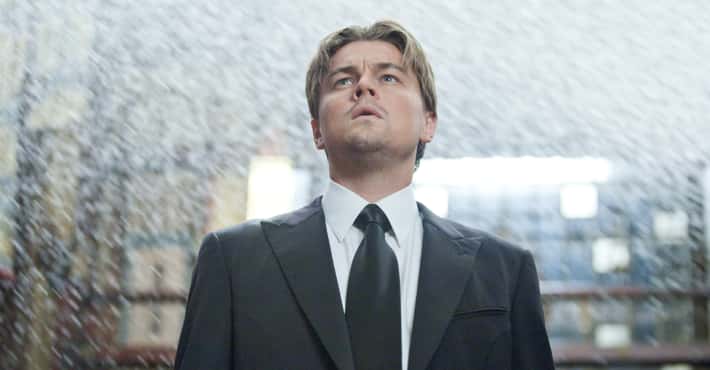

102 Psychology Films You Must See

Here’s a list of psychological films that incorporate psychological concepts.
If you’re looking for psychological films on Netflix, click here .
- A Beautiful Mind (2001)
- A Clockwork Orange (1971)
- A Monster Calls (2016) – Film review by Dr Berney Wilkinson and Dr Richard Marshall
- A Serbian Film (2010)
- About Time (2013) – Film review by Isabel William
- Adaptation (2002)
- American Psycho (2000)
- As Good As It Gets (1997)
- Awakenings (1991)
- Berlin Syndrome (2017)
- Black Swan (2011)
- Bridget Jones (2001) – Film review by Isabel William
- Cape Fear (1991)
- Cocoon (1985) – Film review by Jan Cutt
- Colors of Night (1994)
- Crash (2004)
- Dirty Filthy Love (2004)
- Donnie Darko (2001)
- Dr Strange (2016) – Film review by Adam Knowles
- Duel (1971)
- Eternal Sunshine of the Spotless Mind (2004)
- Experimenter (2015) – Film review by Dr Berney Wilkinson and Dr Richard Marshall
- Extremely Loud & Incredibly Close (2011)
- Faces in the Crowd (2011)
- Fatal Attraction (1987)
- Fight Club (1999)
- First Love (2019)
- Get Out (2017)
- Girl, Interrupted (1999)
- Gone Girl (2014)
- Good Will Hunting (1997)
- Hannibal Rising (2007)
- Henry: Portrait of a Serial Killer (1986)
- Identity (2003)
- I am Sam (2001)
- Inception (2010)
- Inside Out (2015) – Film review by Dr Berney Wilkinson and Dr Richard Marshall
- Jacob’s Ladder (1990)
- Joker (2019)
- Journey’s End (2017) – Film review by Dr Stella Compton-Dickinson
- Killing Me Softly (2002)
- Limitless (2011)
- Memento (2000)
- Me, Myself & Irene (2000) – Film review by Scott Trettenero
- Missery (1990)
- My Life (1993)
- One Flew Over the Cuckoo’s Nest (1975) – Film review by Maxwell Guttman, LCSW
- Paprika (2006)
- Porky’s (1981) – Film review by Miles Ashford, PhD
- Pretty Woman (1990)
- Psychology of Secrets (2013)
- Rain Man (1988)
- Raising Cain (1992)
- Red Dragon (2002)
- Requiem for a Dream (2000)
- Robocop 2 (1990) – Film review by Maxwell Guttman, LCSW
- Room (2015)
- Sex and the City (2008) – Film review by Isabel William
- Shutter Island (2010)
- Side Effects (2013)
- Spider (2002)
- Split (2016)
- Sybil (1976)
- Taxi Driver (1976)
- The 9th Life of Louis Drax (2016)
- The Aviator (2004)
- The Blind Side (2009)
- The Breakfast Club (1985)
- The Cable Guy (1996)
- The Deer Hunter (1978)
- The Experimenter (2015)
- The Game (1997)
- The Girl on the Train (2016)
- The Jungle Book (2016) – Film review by Jean-Luc Vannier
- The Machinist (2005)
- The Madness of King George (1994) – Film review by Maxwell Guttman, LCSW
- The Number 23 (2007)
- The Naked Face (1984)
- The Perks of Being a Wallflower (2012) – Film review by Berney Wilkinson, PhD and Richard Marshall, PhD
- The Pursuit of Happyness (2006)
- The Shining (1980)
- The Silence of the Lambs (1991)
- The Sixth Sense (1999)
- The Soul Keeper (2002)
- The Stanford Prison Experiment (2015)
- The Stepfather (2009)
- They (2002)
- Three Faces of Eve (1957)
- Titanic (1997) – Film review by Dale Burden
- Trading Places (1983) – Film review by Dale Burden
- Vanilla Sky (2001)
- Veronika Decides to Die (2009)
- Vertigo (1958)
- What About Bob (1991)
- What’s Eating Gilbert Grape (1994)
- When a Stranger Calls (2006)
- 12 Angry Men (1957)
- 28 Days (2000)
The psychology of film is a subfield of the psychology of art that studies the characteristics of film and its production in relation to perception, cognition, narrative understanding, and emotion .
Related Articles
Dr nigel maclennan wins appeal against british psychological society in whistleblowing case, psychreg wins “vlogger of the year” at mental health blog awards 2024, icpce 2024 gathers global voices to discuss mental health and education in ho chi minh city, vietnam, intensive care doctor’s new book sheds light on life and death in the icu, institute of psychosexual medicine celebrates its golden anniversary, willbe brings groundbreaking approach to perimenopause and longevity to the pause live event, community care provider announced as finalist in 2 prestigious 2024 laing buisson awards, new books enrich palgrave macmillan’s animal ethics series, reflecting growing interest in the field, oxford summer school to celebrate the pioneers of animal protection, psychreg shortlisted for blogger and vlogger of the year at mhba 2023, psychreg announces best abstract awards winners at icpce 2023, freelance editor wanted: join the psychreg team, boost your knowledge and skills to help patients with eating disorders in your day-to-day clinical work, gambling industry levy welcomed by think-tank that first proposed the policy, mind matters reminds veterinary mental health researchers of upcoming funding and knowledge exchange opportunities, new book ‘the building blocks of life’ criticises uk nutrition policy and highlights micronutrient shortfalls in population, a comprehensive guide to spss in psychology: mastering the basics, the top 10 must-watch psychological thriller films, ‘coaching wisdom: voices of the gay coaches alliance’ – book review, call for abstracts: icpce 2023, ground-breaking new book explores ethics and law in relation to animals, mmi to run neurodiversity stream at bsava congress, new book ‘freaky thinking’ aims to challenge readers change the way they think, enhancing mental health care: incorporating neuropsychology principles into multidisciplinary teams.

Psychreg is a digital media company and not a clinical company. Our content does not constitute a medical or psychological consultation. See a certified medical or mental health professional for diagnosis.
- Privacy Policy
© Copyright 2014–2034 Psychreg Ltd
- PSYCHREG JOURNAL
- MEET OUR WRITERS
- MEET THE TEAM
Select Page
15 Best Psychological Films of the 21st Century — So Far!
All movies may be an escape, but psychological thrillers are a total mind trip. These type of films make us question our sense of reality, while simultaneously asking, “What all is actually possible?” No wonder psychological thrillers have some of the highest box office numbers and viewer ratings of any genre — movie goers love them!
For instance, remember the audible gasp that went through the theater at the end of The Sixth Sense (1999), when Bruce Willis’s character realizes he’s actually dead? That single moment in film history spurred a renewed love of the psychological thriller, and Hollywood sought new mind-bending ideas as fast as screenwriters could come up with them. The result has been 17 years of thought-provoking, provocative, brain-twisting movies that have challenged everything we think we know. Below are the 15 best psychological films of the 21st century so far, based on reviews, awards, “Best Of” lists, and of course, our own opinion. How many have you seen?
American Psycho

A Beautiful Mind

Mulholland Drive

The Butterfly Effect

The Machinist

The Prestige

The Experiment

Shutter Island

Recent Posts
- 10 Historic European Monarchs Plagued by Mental Illness
Ranking the Best Online Psych Degree Programs
- Top 10 Psychology Degrees Online (Bachelor’s) 2018
- 10 Tuition-Free Colleges Where You Can Earn Your Psychology Degree
- Top 5 Best Online Ph.D. in Psychology Degree Programs 2017-2018
- Top 10 Best Online Masters in Psychology Degree Programs
- Top 10 Online Master’s in Counseling Degrees 2018
- Top 5 Psy.D. Online Degree Programs 2018
Featured Articles
- 15 Best Psychological Films of the 21st Century — So Far!
- 15 Natural Ways to Boost Your Mood
- 15 Weirdest Sleep Experiments Ever Conducted
- History’s 10 Most Fascinating Psychological Mysteries
- 30 Great Scholarships for Psychology Students 2020
- Top 30 Psychology Blogs 2020
- 100 Psychology Tools & Resources for Understanding the Human Mind
- 5 Strangest Mental Disorders [Infographic]
- Executive Twist: Inside the Mind of a CE(psych)O [Infographic]
- Psychology Degree FAQ
- 10 Effective Treatments for Seasonal Affective Disorder
Psychology Degree Profiles
- Psychology Degree Salary
- Psychology Degree Careers
- Clinical Psychology Degree
- Sports Psychology Degree
- School Psychology Degree
- Criminal Psychology Degree
- Forensic Psychology Degree
- Child Psychology Degree
Psych Sites For You
- Bad Science
- The Mouse Trap
- In The News
- Research Blogging
- Neuronarrative
- Psychology Today: Essentials
- Association for Psychological Science
- The Situationist
- Psych Central
- Neuromarketing
Site Information
- About Psych Degrees
Log in or sign up for Rotten Tomatoes
Trouble logging in?
By continuing, you agree to the Privacy Policy and the Terms and Policies , and to receive email from the Fandango Media Brands .
By creating an account, you agree to the Privacy Policy and the Terms and Policies , and to receive email from Rotten Tomatoes and to receive email from the Fandango Media Brands .
By creating an account, you agree to the Privacy Policy and the Terms and Policies , and to receive email from Rotten Tomatoes.
Email not verified
Let's keep in touch.

Sign up for the Rotten Tomatoes newsletter to get weekly updates on:
- Upcoming Movies and TV shows
- Rotten Tomatoes Podcast
- Media News + More
By clicking "Sign Me Up," you are agreeing to receive occasional emails and communications from Fandango Media (Fandango, Vudu, and Rotten Tomatoes) and consenting to Fandango's Privacy Policy and Terms and Policies . Please allow 10 business days for your account to reflect your preferences.
OK, got it!
- About Rotten Tomatoes®
- Login/signup
Movies in theaters
- Opening This Week
- Top Box Office
- Coming Soon to Theaters
- Certified Fresh Movies
Movies at Home
- Fandango at Home
- Prime Video
- Most Popular Streaming Movies
- What to Watch New
Certified fresh picks
- 95% Heretic Link to Heretic
- 92% Small Things Like These Link to Small Things Like These
- 79% Bird Link to Bird
New TV Tonight
- 100% Like Water for Chocolate: Season 1
- 75% Citadel: Honey Bunny: Season 1
- 100% Outer Banks: Season 4
- -- Arcane: League of Legends: Season 2
- -- Inspector Ellis: Season 1
- -- Game Changers: Season 1
- -- Eat, Slay, Love: Season 1
- -- Countdown: Paul vs Tyson: Season 1
- -- Until I Kill You: Season 1
- -- Bank Under Siege: Season 1
Most Popular TV on RT
- 94% The Penguin: Season 1
- 94% The Diplomat: Season 2
- 83% Agatha All Along: Season 1
- 100% Lioness: Season 2
- -- Don't Come Home: Season 1
- 77% Disclaimer: Season 1
- 100% Somebody Somewhere: Season 3
- -- Murder Mindfully: Season 1
- 100% Silo: Season 2
- Best TV Shows
- Most Popular TV
Certified fresh pick
- 90% Hysteria!: Season 1 Link to Hysteria!: Season 1
- All-Time Lists
- Binge Guide
- Comics on TV
- Five Favorite Films
- Video Interviews
- Weekend Box Office
- Weekly Ketchup
- What to Watch
Best TV Series on Disney+ (November 2024)
100 Best Movies on Disney+ (November 2024)
What to Watch: In Theaters and On Streaming.
Awards Tour
TV Premiere Dates 2024
The Most Anticipated Movies of 2025
- Trending on RT
- Wicked Livestream
- Holiday Programming Guide
- Wicked Social Reactions
- Verified Hot Movies
The Sleep Experiment
Where to watch.
Watch The Sleep Experiment with a subscription on Prime Video, rent on Fandango at Home, Apple TV, or buy on Fandango at Home, Apple TV.
Critics Reviews
Audience reviews, cast & crew.
John Farrelly
Rob James Capel
Sam McGovern
Steven Jess
Will Murphy
Barry John Kinsella
Browse interesting keywords
More to explore, movie charts.
- Most Popular Movies
- Top 250 Movies
- Top Rated Indian Movies
Advanced search
Recently viewed.

IMAGES
VIDEO
COMMENTS
Release Calendar Top 250 Movies Most Popular Movies Browse Movies by Genre Top Box Office Showtimes & Tickets Movie News India Movie Spotlight. TV Shows. ... Psychological Experiment Films. by Domtron • Created 12 years ago • Modified 12 years ago.
A relatively common trope in horror films and psychological thrillers, the concept of human experiments is truly horrific due to the realities of their existence. From World War II Nazi experiments to the birth of psychology field testing, the implantation of testing humans has resulted in a lot of suffering, but also a lot of knowledge about ...
Psychological experiment movies, a provocative cinematic genre, delve deep into the labyrinthine recesses of the human mind, exposing the often unsettling truths that lurk within. These films, with their tantalizing blend of science and suspense, have captivated audiences for decades, offering a unique window into the complexities of human ...
Experimenter: Directed by Michael Almereyda. With Peter Sarsgaard, Winona Ryder, Jim Gaffigan, Anthony Edwards. In 1961, famed social psychologist Stanley Milgram conducted a series of radical behavior experiments that tested ordinary humans' willingness to obey authority.
14. Shutter Island (2010) Martin Scorsese's neo-noir psychological thriller, based on Dennis Lehane's 2003 novel of the same name, follows U.S. Marshal Edward "Teddy" Daniels (Leonardo DiCaprio) and his new partner, Chuck Aule (Mark Ruffalo) who are investigating the Ashecliffe Hospital for the criminally insane on Shutter Island after one of its patients - Rachel Solando, who was ...
The 40 Best Psychology Movies that entertain, educate, inspire us and also serve as valuable tools for exploring the intricacies of the human mind. ... The Stanford Prison Experiment (2015) Based on the infamous 1971 psychology experiment, this film explores the effects of power dynamics and situational factors on human behavior. It offers a ...
The Experiment: Directed by Paul T. Scheuring. With Adrien Brody, Forest Whitaker, Cam Gigandet, Clifton Collins Jr.. 26 men are chosen to participate in the roles of guards and prisoners in a psychological study that ultimately spirals out of control.
Scientists are researching time travel in order to reconstruct their society and experiment on the protagonist, whose psychological link to the past is a vague pre-war memory of a beautiful woman (Hélène Chatelain) on the observation platform at an airport, shortly before some chaos arises and a stranger is mysteriously shot.
In 1971, Stanford's Professor Philip Zimbardo (Billy Crudup) conducts a controversial psychology experiment in which college students pretend to be either prisoners or guards, but the proceedings ...
The most pleasingly cerebral of recent American films, "Experimenter" concerns Dr. Stanley Milgram (Peter Sarsgaard in an expertly shaded and intelligent performance), the creator of certain enduringly famous experiments in social psychology, which the film starts out by showing us. In a psych lab at Yale University in 1961, Milgram watches ...
Over 300 filmgoers have voted on the 30+ Best Experimental Movies. Current Top 3: Seven Servants, Flushers, Breathful ... outstanding entry within experimental cinema that finds writer-director Darren Aronofsky deftly combining elements of psychological drama, existentialism, and mathematical mysticism to create an unforgettable viewing ...
The Stanford Prison Experiment is a 2015 American docudrama psychological thriller film directed by Kyle Patrick Alvarez, written by Tim Talbott, and starring Billy Crudup, Michael Angarano, Ezra Miller, Tye Sheridan, Keir Gilchrist, Olivia Thirlby, and Nelsan Ellis.The plot concerns the 1971 Stanford prison experiment, conducted at Stanford University under the supervision of psychology ...
The Stanford Prison Experiment: Directed by Kyle Patrick Alvarez. With Billy Crudup, Michael Angarano, Moises Arias, Nicholas Braun. In 1971, twenty-four male students are selected to take on randomly assigned roles of prisoners and guards in a mock prison situated in the basement of the Stanford psychology building.
The Experiment is a 2010 American drama thriller film directed by Paul T. Scheuring [1] and starring Adrien Brody, Forest Whitaker, Cam Gigandet, Clifton Collins Jr., and Maggie Grace, [2] about an experiment which resembles Philip Zimbardo's Stanford prison experiment in 1971. [3]The film is a remake of the 2001 German film Das Experiment, [4] which was directed by Oliver Hirschbiegel.
Unemployed Travis (Adrien Brody) enrolls in a psychological role-playing experiment, where participants assume the identities of inmates and prison guards in an empty jail, with the promise of a ...
The Stanford Prison Experiment (2015) ... The psychology of film is a subfield of the psychology of art that studies the characteristics of film and its production in relation to perception, cognition, narrative understanding, and emotion. Related Articles.
The Experiment 2010. The inspiration for this terrifying thriller is the real-life Stanford Prison Experiment. Written and directed by Paul Scheuring, The Experiment follows 26 men who are hand-picked to participate in a morally questionable psychological experiment about control and submission. Some of the men are given the role of prisoners ...
Tenet (2020)* Science Fiction - Action - Thriller - Sci-Fi Action Thriller - Mysterious Organization "TENET" - Former CIA Agent - Top-Secret Assignment - Mission: Prevent World-War-III - Potential Global Destruction - Men-on-a-Mission - Race Against Time - Palindromic Time Travel - Time-Bending Mission - Time's Arrow Manipulation - Villainous Russian Oligarch Arms ...
Rated 4.5/5 Stars • Rated 4.5 out of 5 stars 01/25/24 Full Review Tom R "The Sleep Experiment" emerges as a riveting addition to the horror genre, delving into the psychological and supernatural ...
action hero alternate history ambiguous ending american abroad anime anti hero avant garde b movie bank heist based on book based on play based on comic based on comic book based on novel based on novella based on short story battle betrayal biker black comedy blockbuster bollywood breaking the fourth wall business caper car accident car chase ...